25 January 2009
A few months ago I decided to give the online magazine Suite 101 a go. It is easy to join them as a writer. You don't get paid directly for doing the work, but you share in the revenue your articles generate for the site.
I have now given Suite101.com a pretty good trial. I have around 100 articles on their site - the articles are around 400-800 words long, mainly in the travel, children's books and food categories.
I have also seen what other Suite101 writers think. So now, I feel in a position to draw some conclusions.
So, is Suite 101 really a "a fulfilling writing job in your area of expertise" as the owners claim?
The bottom line for most people is probably the money. If you are a pro writer, have good web skills and a large body of articles which can be easily recycled, then it may be worth spending time recycling them all for Suite 101.
If you have absolutely no other way of making money by writing, then my conclusion is that Suite 101 is better than nothing, but probably (though not inevitably) not much better. Here's why.
How Much Money Will You Get From Suite101?
You do get paid but you are not paid upfront by the owners of Suite101.com. You post your articles on the site, and the amount of money you make depends on how many page views (or PVs) the articles have, PLUS (or mainly) how many readers click on the ads on the site and what those ads pay. Suite 101 pays a few cents or fractions of a cent each time into your Paypal account. On top of this you get a bonus, either 10% as a contributing writer or a higher rate if you progress through the system by taking more responsibilities and becoming a Feature Writer or Editor.
Under a Dollar A Day
I have remained as a lowly contributing writer and with about 100 articles, I am currently getting enough money to buy me about four cappuccinos a month - maybe five, if I go to a downmarket coffee shop. Feature writers and above get a little more because they get a higher Suite bonus, but not necessarily much more.
I have basically recycled paid articles which I'd already written for magazines, but nevertheless it's taken a fair bit of time over this past year just to get them into the Suite101 format. Many writers on the forums seem to be getting about the same as me, and some are getting less. Some are getting more. The higher earning people seem to be promoting their sites from elsewhere, and also writing on subjects that attract more readers and the Google ads which pay higher per click than others.
What Are These Golden Subjects?
Suite 101's management is coy about what these "golden" subjects are, but I gather from other writers that they are aspects of technology and finance and money-making. They also have a strong US bias - one popular article recently covered top offers in a large US chain store. These top paying articles are also often promoted from their authors' other (popular) sites.
So What Are Potential Earnings?
One writer I talked with on a forum claimed to be able to pay her mortgage on her earnings, although she didn't say what her mortgage was. Another claimed enough to take a partner out to dinner near her home in rural America. One travel writing colleague of mine claims $100 or so a month earned from several hundred articles. I assume these comments are true, but most writers I have met or read in the forums seemed to be living in great hope of earning more than a few dollars a week.
Against these negligible fees is the fact that the articles have so far kept on earning even when the writers have gone away and done something else. Several professional writers I know say they wrote 100+ articles for Suite101 years ago and then got fed up, but they have continued to get their earnings every month. Suite101's own website says that this is a "long term game."
Software That Screens Out Ads
However, that's not necessarily going to remain so. The advent of software which enables users to screen out ads will, if it becomes sufficiently widespread, remove one of the main planks supporting the whole Suite edifice. As I think I have read somewhere before, "past performance is no guarantee of future success."
So financially, I have to say that unless you already have a huge body of recyclable work, you might well be better off building up a different type of business than devoting time to Suite 101. However, there's more to Suite 101 than this. THe other pros and cons are set out below.
OTHER PROS AND CONS OF WRITING ON SUITE 101
Pros
A. Free Web Writing Tutorial
The website and its editors offer a comprehensive free home tutorial on writing for the web. If, like me, you can't wade your way through all that detailed and boring stuff, you'll find you just have to, otherwise your articles get taken offline. You do learn how to use keywords and Google adwords to the best effect. They also teach you about making "content webs" and they help you structure your articles to make maximum impact.
B. Write About (Nearly) Whatever You Like
You can write about whatever you like (within bounds of decency) and that is liberating and fun. I feel that the owners of certain places have tried very hard to offer top quality and deserve any publicity I can give. Writing these articles gives me a nice warm fuzzy feeling because I think I've done my good deed for the day. I don't think Suite 101 likes you openly plugging your home business, though.
C. Build A Larger Web Presence
If you are aiming to build up a good web presence, then Suite 101 can be a useful tool. If you use it carefully, you can cross refer readers to other things you have written on other sites and build up a "content web" to link all your online material. The most successful Suite 101 writers seem to use their work as part of a larger strategy. Their other outlets cross-refer readers to all their Suite articles.
Cons
1. Formulaic Writing
If you are concerned about your writing style - forget it. You can't write quirky, gripping or literary articles for Suite 101 because of the constraints placed upon you. The articles are written to a rigid formula which, among other things, requires you to repeatedly use your "keywords" at certain points and provide "lead-ins" and "conclusions." These demands can sometimes become ridiculous.
For instance, when I wrote some "trivial pursuit" type articles, they were repeatedly taken offline because I had not provided a "meaty conclusion" summing up the points I had made. Just try writing a trivia quiz and summing up your conclusions in a couple of paragraphs - it's impossible!
Eventually the trivia articles were taken offline because the editor just didn't know how to deal with them, and my work on them went to waste. It was frustrating because they were earning more than my other articles and were not recycled, involving quite a lot of research.
Cog in a Machine
Worse than this, if you care about your writing style, and prize your individual voice, then it can be embarrassing to have all those Suite articles up under your name. You're not allowed to take them down. You are very much a cog in a machine at Suite.
2. Clunky Software
The software for uploading articles is very clunky. Sometimes the text doesn't save properly, or the finished version has layout problems which were not there in the draft. I found that a good deal of my time was spent in going back and fixing sentence run-ons, or type-faces which did not display properly.
3. Bzzz Bzzz....Being A Drone?
Although there are good forums, the chain of command is by no means clear and you are not protected from incompetent editors. There seems to be no dispute resolution process. I suffered a difficult and unreasonable editor at one stage and there seemed no way to deal with him. This reinforced my existing feeling that the magazine was run for those who were at the top, and they had persuaded thousands of people to devote lots of time and effort for free (or almost-free) to making the thing a success. Not surprisingly, they did not want the drones to run the hive.
4. Not Much Professional Recognition
The website promises you "business cards, media passes, PR and free products to review." Most of the PR companies I work with in my "real" writing life either do not know Suite 101 or do not regard it as worthy of consideration. They are rarely interested one way or the other if I offer to write Suite articles, but if I do offer, they want these as well as a piece for a magazine or newspaper.
Conclusion
For a novice writer it could be worth having a go. At least you get something, even if it is only enough to keep you in chewing gum - and at least your material gets read.
Likewise, if you can be bothered to spend the time building up an article body, Suite 101 could help you widen your presence on the web - although there may be better ways of doing this.
If you are a professional, it is probably not worth bothering unless you can recycle. All but two of the professional writers I have spoken to about Suite 101 have given it up because they ultimately felt they were losing more time than they gained money. Most professionals follow Dr. Johnson's advice and only write for money. Unless times are truly hard, the time we spend on Suite101 articles, however easy they may be to write, is money in which we could be writing proper paid stuff that we can be proud of
Indeed, if you already have a professional reputation, you may like to consider whether writing on a click-per-view site will really enhance it.
The solitary pro I know who continues full steam ahead on Suite has been running down the "real" writing activities and wants to build up enough Suite 101 articles to help finances in their old age. I hope it works (the person is a wonderful writer) but I feel they're relying overly on the model continuing to be workable and do as well as it has done in the past.
Jam Tomorrow...
Or, as Lewis Carroll would have said (and in fact, did almost say) : "Jam tomorrow, jam yesterday, but rarely much jam today!"
I have now given Suite101.com a pretty good trial. I have around 100 articles on their site - the articles are around 400-800 words long, mainly in the travel, children's books and food categories.
I have also seen what other Suite101 writers think. So now, I feel in a position to draw some conclusions.
So, is Suite 101 really a "a fulfilling writing job in your area of expertise" as the owners claim?
The bottom line for most people is probably the money. If you are a pro writer, have good web skills and a large body of articles which can be easily recycled, then it may be worth spending time recycling them all for Suite 101.
If you have absolutely no other way of making money by writing, then my conclusion is that Suite 101 is better than nothing, but probably (though not inevitably) not much better. Here's why.
How Much Money Will You Get From Suite101?
You do get paid but you are not paid upfront by the owners of Suite101.com. You post your articles on the site, and the amount of money you make depends on how many page views (or PVs) the articles have, PLUS (or mainly) how many readers click on the ads on the site and what those ads pay. Suite 101 pays a few cents or fractions of a cent each time into your Paypal account. On top of this you get a bonus, either 10% as a contributing writer or a higher rate if you progress through the system by taking more responsibilities and becoming a Feature Writer or Editor.
Under a Dollar A Day
I have remained as a lowly contributing writer and with about 100 articles, I am currently getting enough money to buy me about four cappuccinos a month - maybe five, if I go to a downmarket coffee shop. Feature writers and above get a little more because they get a higher Suite bonus, but not necessarily much more.
I have basically recycled paid articles which I'd already written for magazines, but nevertheless it's taken a fair bit of time over this past year just to get them into the Suite101 format. Many writers on the forums seem to be getting about the same as me, and some are getting less. Some are getting more. The higher earning people seem to be promoting their sites from elsewhere, and also writing on subjects that attract more readers and the Google ads which pay higher per click than others.
What Are These Golden Subjects?
Suite 101's management is coy about what these "golden" subjects are, but I gather from other writers that they are aspects of technology and finance and money-making. They also have a strong US bias - one popular article recently covered top offers in a large US chain store. These top paying articles are also often promoted from their authors' other (popular) sites.
So What Are Potential Earnings?
One writer I talked with on a forum claimed to be able to pay her mortgage on her earnings, although she didn't say what her mortgage was. Another claimed enough to take a partner out to dinner near her home in rural America. One travel writing colleague of mine claims $100 or so a month earned from several hundred articles. I assume these comments are true, but most writers I have met or read in the forums seemed to be living in great hope of earning more than a few dollars a week.
Against these negligible fees is the fact that the articles have so far kept on earning even when the writers have gone away and done something else. Several professional writers I know say they wrote 100+ articles for Suite101 years ago and then got fed up, but they have continued to get their earnings every month. Suite101's own website says that this is a "long term game."
Software That Screens Out Ads
However, that's not necessarily going to remain so. The advent of software which enables users to screen out ads will, if it becomes sufficiently widespread, remove one of the main planks supporting the whole Suite edifice. As I think I have read somewhere before, "past performance is no guarantee of future success."
So financially, I have to say that unless you already have a huge body of recyclable work, you might well be better off building up a different type of business than devoting time to Suite 101. However, there's more to Suite 101 than this. THe other pros and cons are set out below.
OTHER PROS AND CONS OF WRITING ON SUITE 101
Pros
A. Free Web Writing Tutorial
The website and its editors offer a comprehensive free home tutorial on writing for the web. If, like me, you can't wade your way through all that detailed and boring stuff, you'll find you just have to, otherwise your articles get taken offline. You do learn how to use keywords and Google adwords to the best effect. They also teach you about making "content webs" and they help you structure your articles to make maximum impact.
B. Write About (Nearly) Whatever You Like
You can write about whatever you like (within bounds of decency) and that is liberating and fun. I feel that the owners of certain places have tried very hard to offer top quality and deserve any publicity I can give. Writing these articles gives me a nice warm fuzzy feeling because I think I've done my good deed for the day. I don't think Suite 101 likes you openly plugging your home business, though.
C. Build A Larger Web Presence
If you are aiming to build up a good web presence, then Suite 101 can be a useful tool. If you use it carefully, you can cross refer readers to other things you have written on other sites and build up a "content web" to link all your online material. The most successful Suite 101 writers seem to use their work as part of a larger strategy. Their other outlets cross-refer readers to all their Suite articles.
Cons
1. Formulaic Writing
If you are concerned about your writing style - forget it. You can't write quirky, gripping or literary articles for Suite 101 because of the constraints placed upon you. The articles are written to a rigid formula which, among other things, requires you to repeatedly use your "keywords" at certain points and provide "lead-ins" and "conclusions." These demands can sometimes become ridiculous.
For instance, when I wrote some "trivial pursuit" type articles, they were repeatedly taken offline because I had not provided a "meaty conclusion" summing up the points I had made. Just try writing a trivia quiz and summing up your conclusions in a couple of paragraphs - it's impossible!
Eventually the trivia articles were taken offline because the editor just didn't know how to deal with them, and my work on them went to waste. It was frustrating because they were earning more than my other articles and were not recycled, involving quite a lot of research.
Cog in a Machine
Worse than this, if you care about your writing style, and prize your individual voice, then it can be embarrassing to have all those Suite articles up under your name. You're not allowed to take them down. You are very much a cog in a machine at Suite.
2. Clunky Software
The software for uploading articles is very clunky. Sometimes the text doesn't save properly, or the finished version has layout problems which were not there in the draft. I found that a good deal of my time was spent in going back and fixing sentence run-ons, or type-faces which did not display properly.
3. Bzzz Bzzz....Being A Drone?
Although there are good forums, the chain of command is by no means clear and you are not protected from incompetent editors. There seems to be no dispute resolution process. I suffered a difficult and unreasonable editor at one stage and there seemed no way to deal with him. This reinforced my existing feeling that the magazine was run for those who were at the top, and they had persuaded thousands of people to devote lots of time and effort for free (or almost-free) to making the thing a success. Not surprisingly, they did not want the drones to run the hive.
4. Not Much Professional Recognition
The website promises you "business cards, media passes, PR and free products to review." Most of the PR companies I work with in my "real" writing life either do not know Suite 101 or do not regard it as worthy of consideration. They are rarely interested one way or the other if I offer to write Suite articles, but if I do offer, they want these as well as a piece for a magazine or newspaper.
Conclusion
For a novice writer it could be worth having a go. At least you get something, even if it is only enough to keep you in chewing gum - and at least your material gets read.
Likewise, if you can be bothered to spend the time building up an article body, Suite 101 could help you widen your presence on the web - although there may be better ways of doing this.
If you are a professional, it is probably not worth bothering unless you can recycle. All but two of the professional writers I have spoken to about Suite 101 have given it up because they ultimately felt they were losing more time than they gained money. Most professionals follow Dr. Johnson's advice and only write for money. Unless times are truly hard, the time we spend on Suite101 articles, however easy they may be to write, is money in which we could be writing proper paid stuff that we can be proud of
Indeed, if you already have a professional reputation, you may like to consider whether writing on a click-per-view site will really enhance it.
The solitary pro I know who continues full steam ahead on Suite has been running down the "real" writing activities and wants to build up enough Suite 101 articles to help finances in their old age. I hope it works (the person is a wonderful writer) but I feel they're relying overly on the model continuing to be workable and do as well as it has done in the past.
Jam Tomorrow...
Or, as Lewis Carroll would have said (and in fact, did almost say) : "Jam tomorrow, jam yesterday, but rarely much jam today!"
26 October 2010
Gave a talk to the Daresbury Lewis Carroll society last weekend, and afterwards I was approached by a local lady whose family own land very near the birthplace and had done so for generations. She picked up on a point I made, that Carroll’s childhood had been very remote and cut off from the world. Based on her own family's history and her knowledge of the area, she added that the Dodgsons would have been isolated even from the surrounding farmers, who were almost their only near neighbours, because they were not part of the farming community themselves. Given the rigid social structures of the day, it is entirely possible that the little Dodgsons were not even allowed to play with farmers’ children, so it’s just as well there were ten of them!
The following day, Keith and Liz took me to see Lewis Carroll’s birthplace in Morphany Lane, about a mile outside Daresbury village.
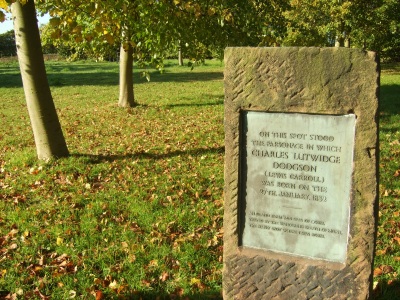
I hadn’t been for several years and thought it was much improved. The foundations of the parsonage where he spent his first eleven years are marked out, and have now been surrounded by a nice wrought iron fence showing ears of corn – a reference to the
“…island farm midst seas of corn, that happy spot where I was born.”
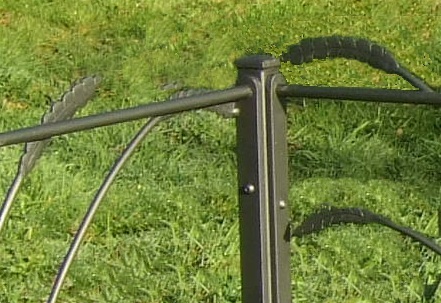
And the entrance to the house is marked by an arch which echoes the archway that led into the original house. This ironwork gives a much better impression of the now vanished parsonage, which burned down in the 1880s, some years after the Dodgsons left.
I was, as before, struck by how tiny the floor plan of the house was. It must have been a tremendous squash with ten children, plus servants. I am not aware of any information about how it was organised, but I imagine the young Charles would have had to share a bedroom with several other siblings – when they moved to Croft he was given his own room.
Here is the view from the front of the house.
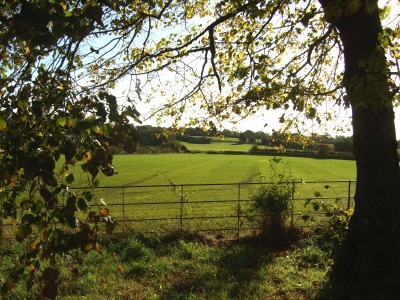
Here’s another attractive wrought iron feature: the well cover, featuring a Dormouse. The family had a private water supply, which may have helped protect them from the cholera which was rampant during CLD’s childhood.
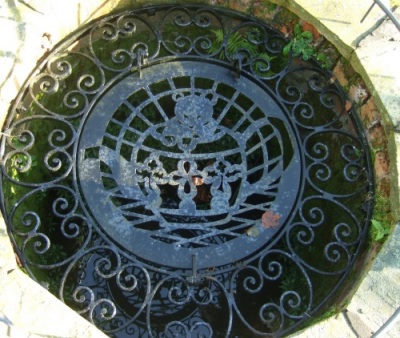
We then went on to the nearby Davenport’s farm shop, which has a great tea room, and a little garden out the back.
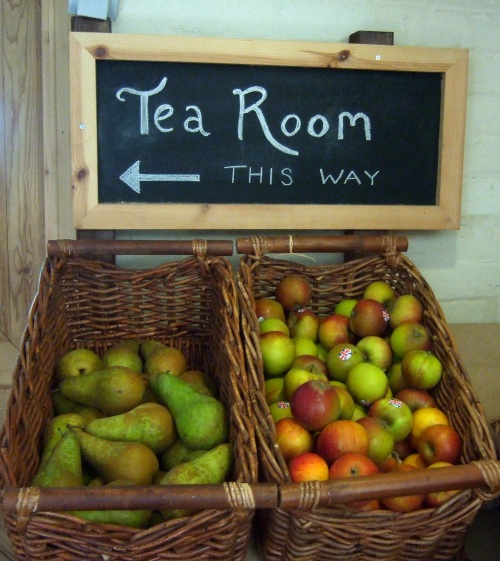
It was too cold to go into the garden. Actually, I was tempted by the sunny, cottagey interior of the main tearoom, and slightly disappointed to find that the Alice in Wonderland tea room was at the back of the shop. Still, it overlooked the garden, and not everyone is quite as keen on sitting in the sun as me. As well as the lacy teacloths and old fashioned chairs, etc. it was decorated with ches sets, paintings, photos, a clock in the shape of a pocket-watch and with Alice collectables over the door.
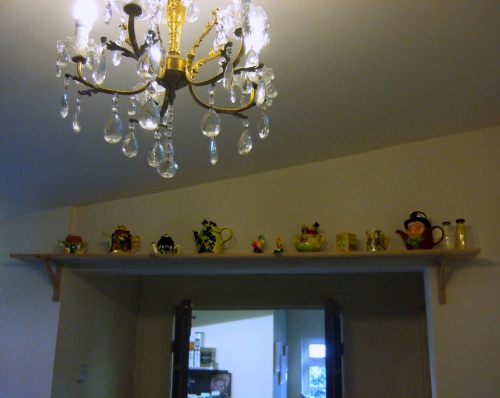
I took a picture just after it had opened in the morning, and wish now that I had photographed us having tea there, and also that I’d got a shot of some of the unusual and interesting cakes. But I did snap a couple of pages from the menu which shows that the café makes a feature of its teas.
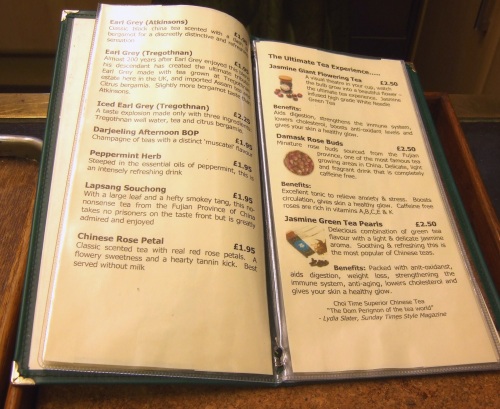
And I bought some home made bread and a bunch of earthy carrots from the fruit on sale outside - there were also some excellent looking apples, but I'm already swamped with them!.
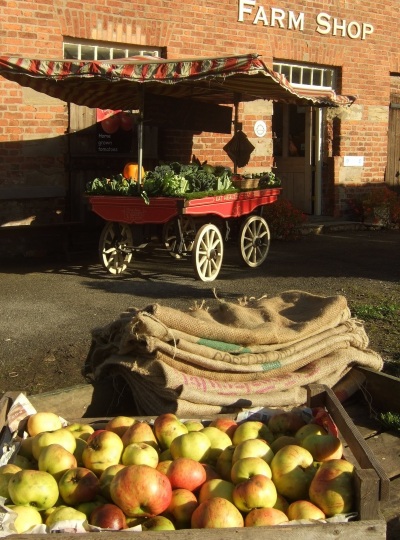
The Davenport's website has a very interesting history of the business. One of the owners, Belinda is a longtime fan. She and other local people had been rather keen on the idea of creating a Lewis Carroll attraction in Walton Hall.
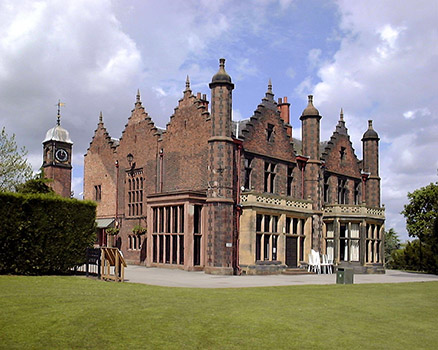
This is a neo Elizabethan mansion, one of the few places where the Dodgson family used to pay social visits during Carroll’s youth. It was one of the places he photographed when he revisited Daresbury on a photographic tour in around 1860, so it was clearly important to him. The local council, which owns it, has been trying to sell it to a local developer, and last I heard there was some controversy about its future.
It became obvious to me that not enough is being done to promote Daresbury’s links with Carroll, and some imaginative thinking is certainly needed. Daresbury’s conference venue, the Daresbury Park hotel, http://www.devere.co.uk/our-locations/daresbury-park.html is modern but extremely corporate and has covered up what many people told me was a lovely tiled Alice mural – presumably it doesn’t fit with the “image” they wish to convey.
The village pub, the Ring O’Bells, is more Alice-themed, and a nice welcoming place.

It doesn’t have any public meeting rooms, though. Perhaps when Daresbury church gets its long awaited extension, things will come together more.
The church was rebuilt after Carroll’s time although the ancient tower will still be as he recalls it. I looked in just before a family church service was about to start. The church was packed, and the bellringers were hard at work inside the tower. With the golden autumnal leaves of the surrounding trees, it was all so … well… so English.
We then went on to Little Moreton Hall, where Liz is a National Trust volunteer. It’s a jewel of a black-and-white building, and of course Liz gave us the best tour that anyone had that day. I don’t know if Carroll ever visited Little Moreton Hall – probably not, since it might have been a farm in his day. My old schoolfriend Penny White, who lives in Chester, managed to make it there too, which made it even more fun for me.
Here's a view of its lichen-covered roof, taken from one of the top windows.
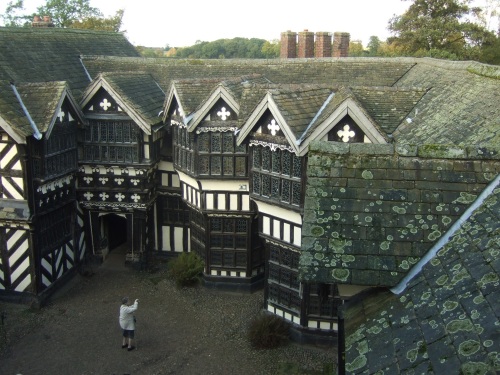
Back in Daresbury, Keith pointed out a rather undistinguished modern bungalow near the parsonage site. When we got back to his house, he showed me what it had replaced – a fabulous black and white hall, very similar in style to Little Moreton, although smaller. It too had been used as a farm, and had become quite run down when it was demolished sometime in the 1960s.
By the time I caught the train back to London, I had plenty to think about, and felt I’d had a really good trip. And we did enjoy the carrots!
The following day, Keith and Liz took me to see Lewis Carroll’s birthplace in Morphany Lane, about a mile outside Daresbury village.

I hadn’t been for several years and thought it was much improved. The foundations of the parsonage where he spent his first eleven years are marked out, and have now been surrounded by a nice wrought iron fence showing ears of corn – a reference to the
“…island farm midst seas of corn, that happy spot where I was born.”

And the entrance to the house is marked by an arch which echoes the archway that led into the original house. This ironwork gives a much better impression of the now vanished parsonage, which burned down in the 1880s, some years after the Dodgsons left.
I was, as before, struck by how tiny the floor plan of the house was. It must have been a tremendous squash with ten children, plus servants. I am not aware of any information about how it was organised, but I imagine the young Charles would have had to share a bedroom with several other siblings – when they moved to Croft he was given his own room.
Here is the view from the front of the house.

Here’s another attractive wrought iron feature: the well cover, featuring a Dormouse. The family had a private water supply, which may have helped protect them from the cholera which was rampant during CLD’s childhood.

We then went on to the nearby Davenport’s farm shop, which has a great tea room, and a little garden out the back.

It was too cold to go into the garden. Actually, I was tempted by the sunny, cottagey interior of the main tearoom, and slightly disappointed to find that the Alice in Wonderland tea room was at the back of the shop. Still, it overlooked the garden, and not everyone is quite as keen on sitting in the sun as me. As well as the lacy teacloths and old fashioned chairs, etc. it was decorated with ches sets, paintings, photos, a clock in the shape of a pocket-watch and with Alice collectables over the door.

I took a picture just after it had opened in the morning, and wish now that I had photographed us having tea there, and also that I’d got a shot of some of the unusual and interesting cakes. But I did snap a couple of pages from the menu which shows that the café makes a feature of its teas.

And I bought some home made bread and a bunch of earthy carrots from the fruit on sale outside - there were also some excellent looking apples, but I'm already swamped with them!.

The Davenport's website has a very interesting history of the business. One of the owners, Belinda is a longtime fan. She and other local people had been rather keen on the idea of creating a Lewis Carroll attraction in Walton Hall.

This is a neo Elizabethan mansion, one of the few places where the Dodgson family used to pay social visits during Carroll’s youth. It was one of the places he photographed when he revisited Daresbury on a photographic tour in around 1860, so it was clearly important to him. The local council, which owns it, has been trying to sell it to a local developer, and last I heard there was some controversy about its future.
It became obvious to me that not enough is being done to promote Daresbury’s links with Carroll, and some imaginative thinking is certainly needed. Daresbury’s conference venue, the Daresbury Park hotel, http://www.devere.co.uk/our-locations/daresbury-park.html is modern but extremely corporate and has covered up what many people told me was a lovely tiled Alice mural – presumably it doesn’t fit with the “image” they wish to convey.
The village pub, the Ring O’Bells, is more Alice-themed, and a nice welcoming place.

It doesn’t have any public meeting rooms, though. Perhaps when Daresbury church gets its long awaited extension, things will come together more.
The church was rebuilt after Carroll’s time although the ancient tower will still be as he recalls it. I looked in just before a family church service was about to start. The church was packed, and the bellringers were hard at work inside the tower. With the golden autumnal leaves of the surrounding trees, it was all so … well… so English.
We then went on to Little Moreton Hall, where Liz is a National Trust volunteer. It’s a jewel of a black-and-white building, and of course Liz gave us the best tour that anyone had that day. I don’t know if Carroll ever visited Little Moreton Hall – probably not, since it might have been a farm in his day. My old schoolfriend Penny White, who lives in Chester, managed to make it there too, which made it even more fun for me.
Here's a view of its lichen-covered roof, taken from one of the top windows.

Back in Daresbury, Keith pointed out a rather undistinguished modern bungalow near the parsonage site. When we got back to his house, he showed me what it had replaced – a fabulous black and white hall, very similar in style to Little Moreton, although smaller. It too had been used as a farm, and had become quite run down when it was demolished sometime in the 1960s.
By the time I caught the train back to London, I had plenty to think about, and felt I’d had a really good trip. And we did enjoy the carrots!
16 November 2010
The trip to New York was great and so was the LCSNA meeting. It was in the NY INstitute of Technology, where Edward Giuliano, a noted Lewis Carroll student and writer, is a big wheel. It was the first time I'd met him in person, and we had a very interesting chat aftewards about the provenance of the Wasp in a Wig. I've always been bothered that there essentially isn't one - and it looks as if it will never be revealed.
To be honest, the first bit of the meeting slightly passed me by, as I was mentally going over the talk, So the brilliance of New Yorker columnist Adam Gopnik, which was mentioned afterwards by several people, didn't make much of an impression, unfortunately.
When it came to giving the talk itself, though, I rather enjoyed it.
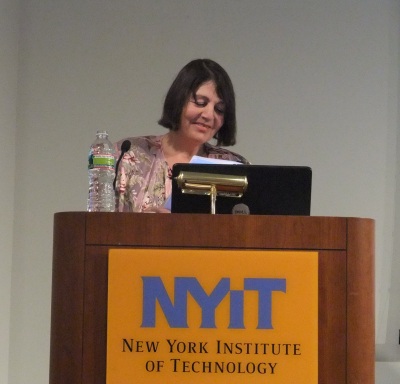
It was good to see some familiar faces, like the Imholzes, and to meet Adam Tannenbaum for the first time.
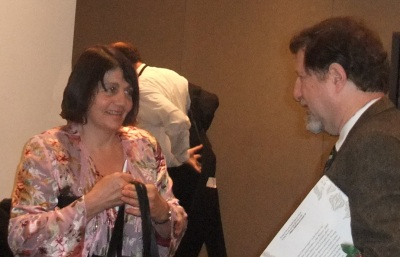
I signed copies of the book - Barnes and Noble were in attendance, and they seemed to sell most of them. Buyers also materialised for all the copies of Lewis Carroll in his Own Account which I had brought along in my luggage.
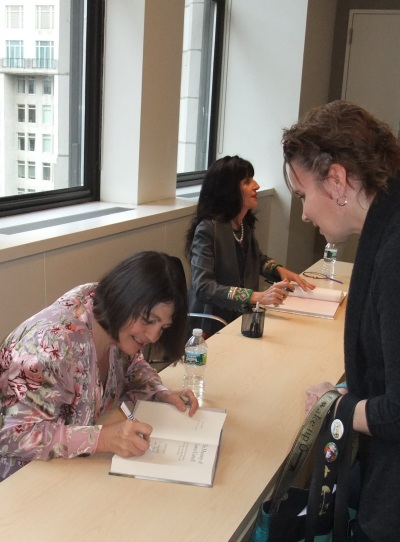
At the book signing I also had my first real life meeting with Mahendra Singh, who was signing his brilliant Snark book (no - that's not him - either of them)
Andrew Sellon, retiring LCSNA
president, was presented with a very nice pen and real ink, so he can carry on raving at his writing desk - not an original remark :)
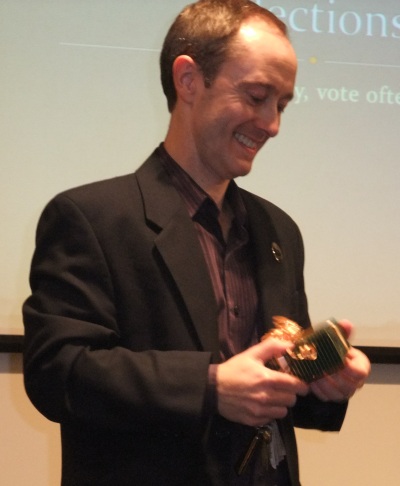
All in all, it was a good humoured, truly nice affair, and afterwards, we all went off to Josephina's restaurant nearby, and relaxed. Here I am sitting with Amy and Erin. Erin, at 16, is probably the youngest LCSNA member - and really, really bright.
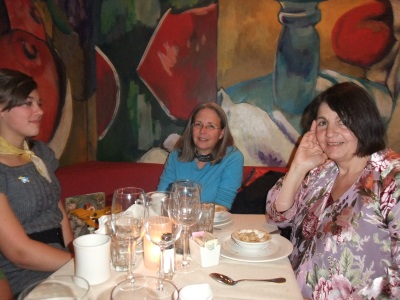
To be honest, the first bit of the meeting slightly passed me by, as I was mentally going over the talk, So the brilliance of New Yorker columnist Adam Gopnik, which was mentioned afterwards by several people, didn't make much of an impression, unfortunately.
When it came to giving the talk itself, though, I rather enjoyed it.

It was good to see some familiar faces, like the Imholzes, and to meet Adam Tannenbaum for the first time.

I signed copies of the book - Barnes and Noble were in attendance, and they seemed to sell most of them. Buyers also materialised for all the copies of Lewis Carroll in his Own Account which I had brought along in my luggage.

At the book signing I also had my first real life meeting with Mahendra Singh, who was signing his brilliant Snark book (no - that's not him - either of them)
Andrew Sellon, retiring LCSNA
president, was presented with a very nice pen and real ink, so he can carry on raving at his writing desk - not an original remark :)

All in all, it was a good humoured, truly nice affair, and afterwards, we all went off to Josephina's restaurant nearby, and relaxed. Here I am sitting with Amy and Erin. Erin, at 16, is probably the youngest LCSNA member - and really, really bright.

11 October 2012
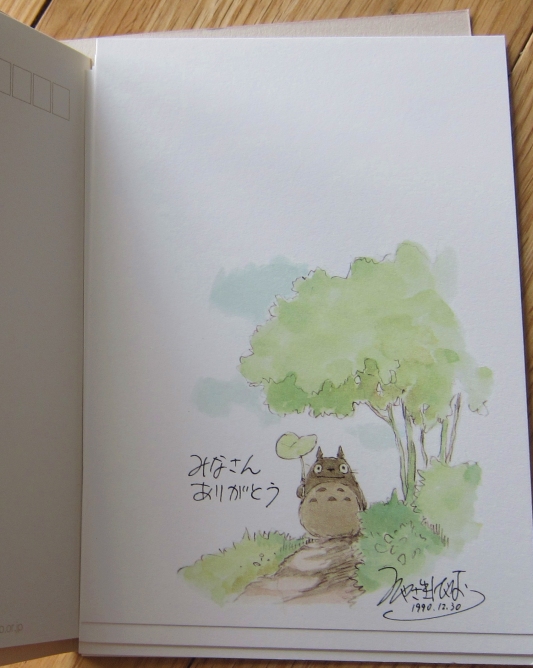
Yoshi in Japan often sends me interesting pieces of Japanese Alice ephemera.He also sent a collection of lovely cards of Totoro, who is one of my favourite cartoon characters - here is one of them, above. I like all the Studio Ghibli movies.
I was looking through the Alice ephemera the other day and there are some that I have not posted. So here they are.
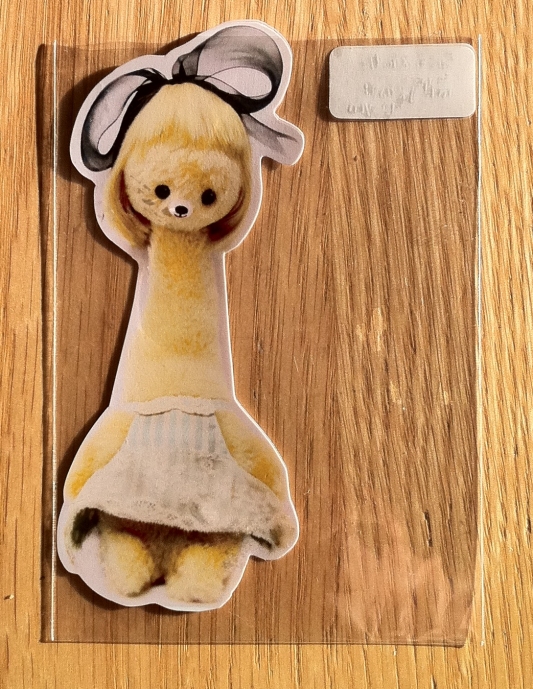
This one is a soft toy in the shape of Alice with her long neck. It's signed on the back. Many of the items that Yoshi sends are signed.
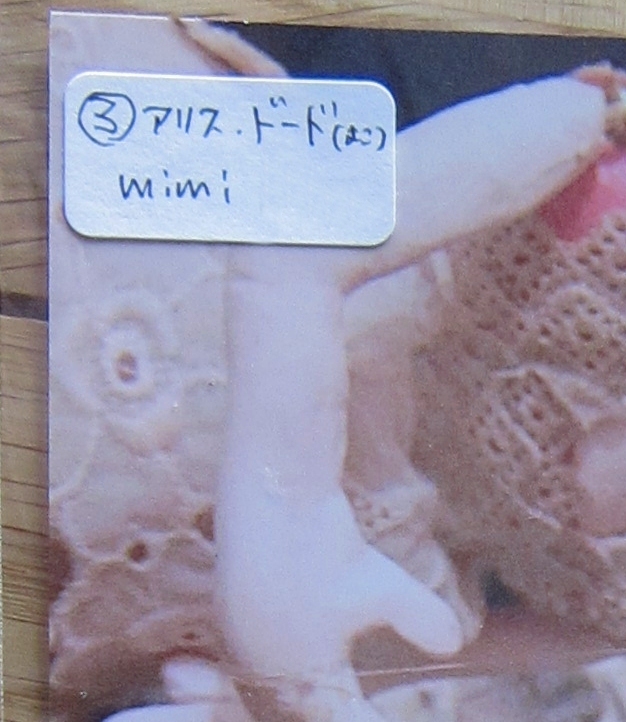
I very much like the clock
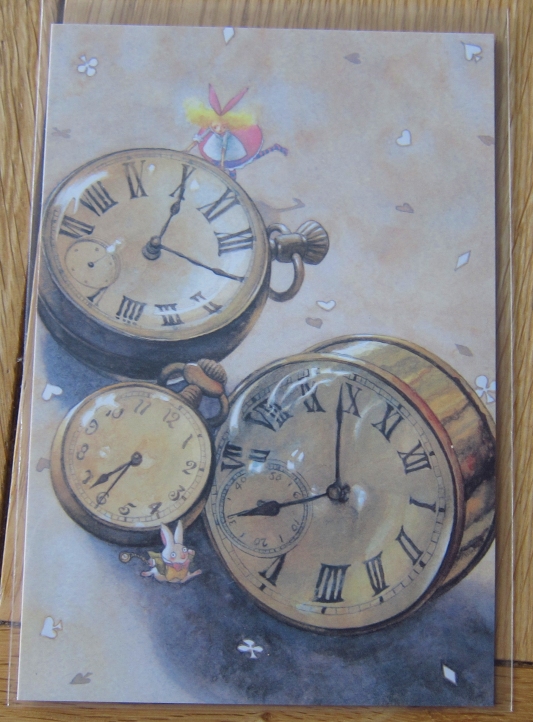
and the cakes
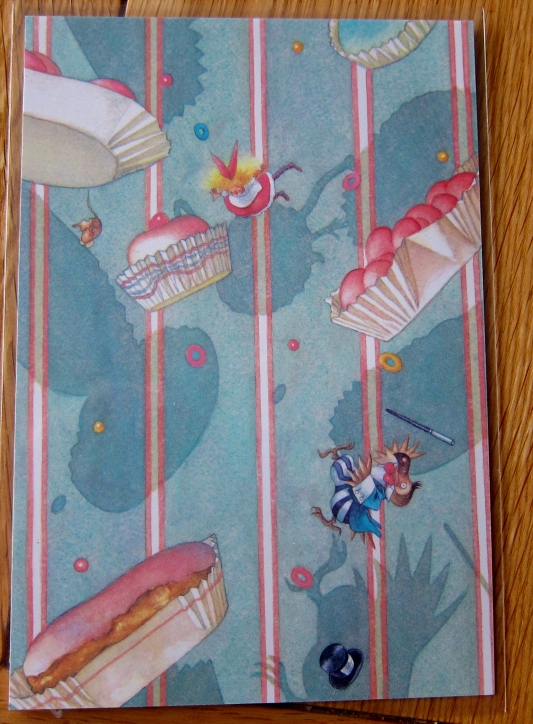
and I don't know why I didn't post them before.
07 August 2008
Nearly a year ago, I wrote : "I've been writing on and off for something called Suite 101 and then continued:
"If you read them, click on some of the ad links for me. This is the way we are supposed to make money, although I am told that you don't make much, and I certainly haven't made any so far, although the stats say that I have accumulated the princely sum of $6.... "
Here a post-script to this. If people are inclined to click through the ads on a friend's page- don't. If Google detects (or thinks it detects) ad fraud, it gets very heavy. Perfectly fair, and I should have thought of that - duh.
Anyway Suite 101 doesn't offer the writer any chance to explain, deal with or change if Google objects to the pattern of clicks. It simply removes all the writer's articles, immediately and permanently, with no procedure for arbitration. This happened to me. Apparently many writers were wiped at the same time as me, in a sort of purge, and didn't know why. Perhaps their friends had clicked their page ads. Some of them were terribly upset to lose all the work they had done in anticipation of future earnings.
For me it was not an unhappy ending. I had become embarrassed about my articles - formulaic, hack and rigidly constrained. I didn't become a writer to do that. Editors I hoped to interest in my writing skills were googling me and coming up with this stuff - but I could not get them off line.
In this, as in other ways, the writer for Suite 101 has no real control.
"If you read them, click on some of the ad links for me. This is the way we are supposed to make money, although I am told that you don't make much, and I certainly haven't made any so far, although the stats say that I have accumulated the princely sum of $6.... "
Here a post-script to this. If people are inclined to click through the ads on a friend's page- don't. If Google detects (or thinks it detects) ad fraud, it gets very heavy. Perfectly fair, and I should have thought of that - duh.
Anyway Suite 101 doesn't offer the writer any chance to explain, deal with or change if Google objects to the pattern of clicks. It simply removes all the writer's articles, immediately and permanently, with no procedure for arbitration. This happened to me. Apparently many writers were wiped at the same time as me, in a sort of purge, and didn't know why. Perhaps their friends had clicked their page ads. Some of them were terribly upset to lose all the work they had done in anticipation of future earnings.
For me it was not an unhappy ending. I had become embarrassed about my articles - formulaic, hack and rigidly constrained. I didn't become a writer to do that. Editors I hoped to interest in my writing skills were googling me and coming up with this stuff - but I could not get them off line.
In this, as in other ways, the writer for Suite 101 has no real control.
11 January 2011
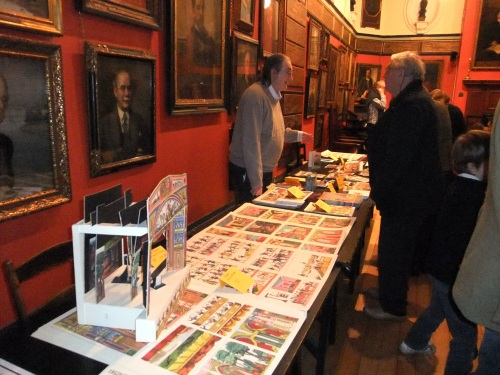
At the 2010 LCS Party at the Art Workers Guild , I picked up a leaflet for Joe Gladwin's performance of "Cinderella" on the toy theatre, in aid of the Pollock's Toy Museum Trust. (and above is a picture of the little stall they had there, selling all kinds of things to interest people who are interested in old toys)
So of course I booked tickets.
I expect Lewis Carroll would have done the same. He was a huge fan of toy theatres and in fact wrote plays for the little theatre which he helped to make in order to entertain his younger brothers and sisters in the rectory in Croft on Tees. It is probably true to say that his passion for this tiny theatre predisposed him to love the grown-up theatre, later in his life.
We loved our outing. Our party included adults and children (9 and 5) and we were all amazed at how charming and entertaining a toy theatre performance can be, even in today's world of electronic entertainment. Of course a lot depends on the operator, and Joe Gladwin is a real puppet theatre pro (take a look at his website). He operated the music, scene changes, all the different voices with enormous skill, keeping the audience gripped the whole time.
The performance took place in a darkened room with only a row of candles before the stage, although the theatre itself was illuminated by electricity. Cinderella's coach and the castle seemed truly magical, as did the Fairy Godmother. Here's a blurry picture of her giving her prologue - sadly, the light from my digital camera screen was extremely noticeable in the darkened auditorium so I decided not to spoil everyone's fun by taking too many photos.
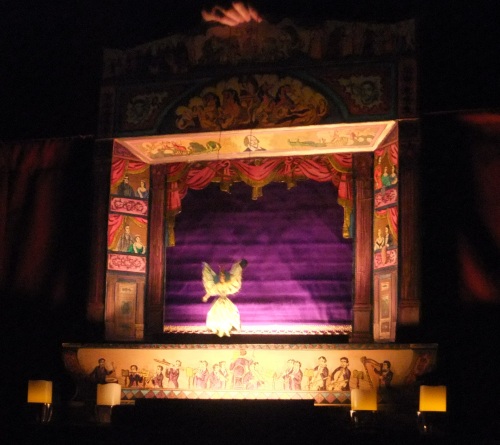
There was also a "slap up tea" promised, and this in fact turned out to be wonderful, with lots of home made cakes and, of course, cucumber sandwiches - surely indispensable in an English slap-up tea!
We discovered that some of the audience members were also interested in old magic lanterns. Vanessa of London Dreamtime was asking around, and she clearly has some kind of an idea for a future project to do with model theatres, magic lanterns and perhaps Pearly Kings and Queens.
Oh, and here is a picture of the theatre from the side, showing the grooves in which the scenery and the cut-out actors move. Incredibly difficult, unless you're someone with the skills of Joe Gladwin - or, presumably, Lewis Carroll.
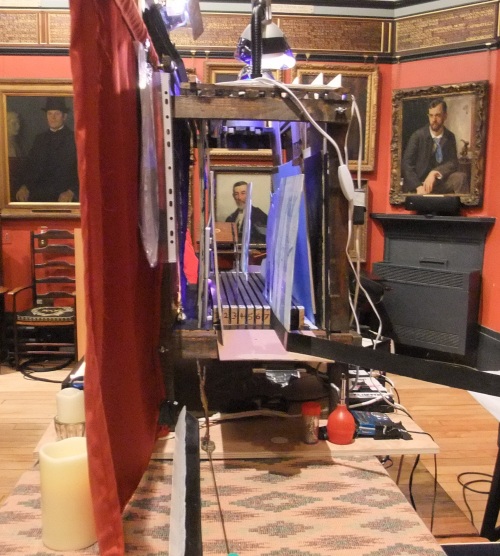
03 September 2008
Writing a biography has made me think about the whole process of biography writing. It feels strange to be setting myself up as an authority on someone else! I'd never do it even about a member of my own family. It's even harder when the subject is dead, and nobody is alive who can say if I'm right or wrong.
The more I pore over the documents, the more I recognise how Carroll approached life himself. He was very good at showing people just enough to enable them to jump to their own conclusions. He didn't put them right if they were wrong, but he never seems to have actually told lies. He was also very clever and very secretive. Knowing a bit about how his mind worked enables me to form hypotheses about hitherto mysterious events in his life, and I can then check them against facts that do exist.
I've written another little piece about him on Suite101 - this time about his games, riddles and puzzles.
The more I pore over the documents, the more I recognise how Carroll approached life himself. He was very good at showing people just enough to enable them to jump to their own conclusions. He didn't put them right if they were wrong, but he never seems to have actually told lies. He was also very clever and very secretive. Knowing a bit about how his mind worked enables me to form hypotheses about hitherto mysterious events in his life, and I can then check them against facts that do exist.
I've written another little piece about him on Suite101 - this time about his games, riddles and puzzles.
01 January 2010
Went to the sales in the West End of London. Yes, it was raining

Among the bargains on offer were two Christmas tree ornaments - Alice and the Queen of Hearts. Here they are seen together in a box of bargains at Foyles famous bookshop in Charing Cross Road with "reduced" labels attached. Poor Alice.
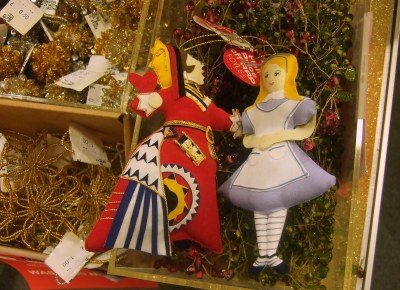

Among the bargains on offer were two Christmas tree ornaments - Alice and the Queen of Hearts. Here they are seen together in a box of bargains at Foyles famous bookshop in Charing Cross Road with "reduced" labels attached. Poor Alice.

28 August 2008
In idle moments (not that I have many at present) I like to photoshop locations for various scenes out of Carroll. This is my idea of the house which has the Mad Tea Party in its back garden. It has no artistic pretensions but I have fun doing these things. It's based on a real house but I've moved windows around, changed the surroundings and added chimneys from the House in the Clouds at Thorpeness, which must be one of the oddest villages in Britain (link here)
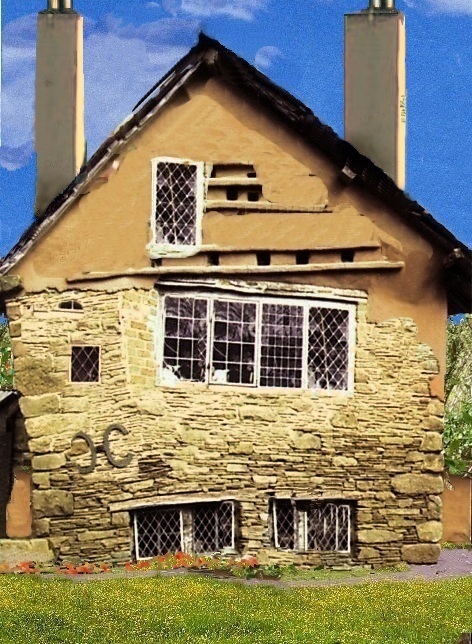

12 October 2008
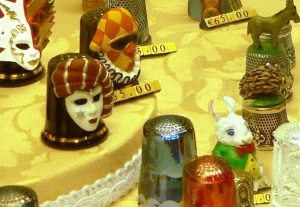 .
. I've just spend a few days in Italy. In Venice, I decided to see how soon I could spot an "Alice" reference. There were innumerable carnival masks and amazing glass objets d'art in the shops but it didn't take long to spot a small White Rabbit coyly hiding amidst glass thimbles and masks.
03 October 2008
Nigel of Bermondsey wrote some Lewis Carroll music which I'm going to put on here as soon as I can figure out how. Meanwhile, here's some of his music.
He has been having some friendly talks about music with Barry Albin Dyer of funeral directors F.A. Albin & Sons. As anyone who has watched the TV programmes knows, Barry's funerals aren't like anyone else's and he's very much part of the Bermondsey scene.
Vanessa is writing stories set in Bermondsey. If she'd only stop saying they were for kids, I reckon she would find someone to publish them. I love them. Bermondsey is an amazing place with a very long, very rich and very fascinating history. I'm hoping the yuppies don't squeeze out everything historical and tough and raw and interesting and turn it into endless luxury flats which could be anywhere from Miami to Helsinki.
I don't think Lewis Carroll ever visited Bermondsey, or, at least, if he did, he never said. A bit too rough for him, I expect.
He has been having some friendly talks about music with Barry Albin Dyer of funeral directors F.A. Albin & Sons. As anyone who has watched the TV programmes knows, Barry's funerals aren't like anyone else's and he's very much part of the Bermondsey scene.
Vanessa is writing stories set in Bermondsey. If she'd only stop saying they were for kids, I reckon she would find someone to publish them. I love them. Bermondsey is an amazing place with a very long, very rich and very fascinating history. I'm hoping the yuppies don't squeeze out everything historical and tough and raw and interesting and turn it into endless luxury flats which could be anywhere from Miami to Helsinki.
I don't think Lewis Carroll ever visited Bermondsey, or, at least, if he did, he never said. A bit too rough for him, I expect.
18 October 2009

Got a little travel story assignment to Cologne, Germany, next December. This is one of the places Carroll visited on his only trip abroad, in 1867. He was holidaying with his pious friend H.P. Liddon and so they spent a lot of time going round churches. When Carroll was on his own he spent more time looking at people, customs and curiosities, and going shopping. Just couldn't be as serious as Liddon. But he was really overcome at the cathedral. He said in his diary that "...We spent about an hour in the cathedral, which I will not attempt to describe further than by saying it was the most beautiful of all churches I have ever seen, or can imagine. If one could imagine the spirit of devotion embodied in any material form, it would be in such a building."
Interesting to contrast his diary with that of Liddon, on the same trip. "Dodgson was overcome by the beauty of Cologne Cathedral. I found him leaning against the rails of the Choir and sobbing like a child. When the verger came to show us over the chapels behind the Choir, he got out of the way, he said that he could not bear the harsh voice of the man in the presence of so much beauty."
Liddon's notes can be read in Edward Wakeling's exhaustively annotated "Lewis Carroll's Diaries", Vol 5. Reading between the lines, Carroll was an emotional, somewhat disorganised companion, not unlike a pleasant boy of about 12 - but he also sounds like a lively, easy going and long suffering traveller, prepared to put up with lack of sleep, discomfort and general aggravation with a smile.
Wonder why he didn't do more travelling. The year after the European trip, his father died, and the weight of looking after his ten brothers and sisters fell onto Carroll's shoulders. Perhaps he didn't have either the time or the money, after that.
I'll be interested to note my own reactions to Cologne Cathedral.
18 October 2015

As part of Alice150, there's an exhibition of Alice related art work and crafts in Tokyo with contributions from 24 artists. Lots of fun work here - I liked these Cheshire cats (click the link and you will see more.) ... but hurry, it's only on until 27 October!
It's at Irias, 2-9-12-1F-B Yanaka,
Taito-ku, Tokyo 110-0001 Japan
07 October 2010
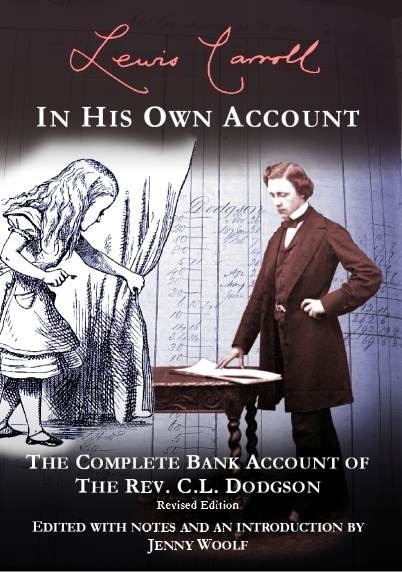
As I’ve said elsewhere on this site, Tony and I transcribed, printed and published Lewis Carroll's private bank account in 2005. With the unstinted help of Edward Wakeling, who is always so willing to assist those with an interest in Lewis Carroll, I tracked down many of the people mentioned in the account. Some of them were mentioned in the letters and diaries, and some were not.
Working slowly through the mass of figures and names, a picture of a real human being emerged. A man who paid his washerwoman and entertained friends well, who contributed to things he felt strongly about, a man who cared about his faith and above all, who was deeply and constantly involved with his family. And, let it be said, a man who by no means wrote everything that happened in his life, into his diary! It was this research which gave me the idea of writing a biography which would above all show Lewis Carroll as a real person.
We published a small edition of the account book because we didn't think that a mass of figures would appeal to the general public. In fact we did miscalculate and the book sold out more quickly than we expected.
For a couple of years after we sold out, secondhand copies appeared occasionally on Amazon. When they all disappeared, and when one priced at some utterly outrageous figure also got sold, and we still continued to get orders from wholesalers, we decided it was time for a small reprint.- and here it is.
I decided to update the original, and was amazed how much more information has trickled in - I'd thought it would only be a matter of altering a few lines! In the end, after days more work, we decided to call this a "Revised edition" because that is what it is.
Print prices have gone up meanwhile, so the price is a couple of pounds higher than the 2005 original, but since our aim was always to get the information out there rather than make a profit, we have tried to keep the price reasonable for such a quantity of privately funded work.
Looking back, I suppose I should have tried to get funding, since the research involved considerable mileage between London and Manchester, and overnight accommodation on several occasions. But when we started, we never anticipated that it could grow the way it did.
And at least this way the project is all ours.!
10 October 2010

All sounds very nerdy but I subscribe to Google Alerts, which flags every new reference to the book. It's saying now that Amazon.com (the US site) only has one copy of "The Mystery of Lewis Carroll" left in stock. (They've ordered more.) It also shows it's currently #3 in books by and about Lewis Carroll, and #24 in British 19th Cent. Literature & Fiction.
Mostly I've stopped looking at these rankings, because they are constantly changing, but one can develop a nerdy fascination with how the book is going up and down.
The main problem at present is how to get "LC in his Own Account" onto Amazon.com. It's listed on the UK site as being available internationally, but not sure how foreign customers are supposed to know this if it doesn't come up on their country's site. Seems that Amazon could be missing a trick here.
The picture above is to prove I'm NOT NOT NOT a nerd. It's Wallpaper* magazine's illustration for its "Istancool" feature. I once went to an event at Wallpaper* and it was fun but the people were almost too cool to speak.
14 October 2010
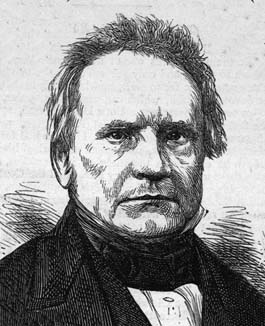
Was clearing out some old files and came across the following story about Charles Babbage, inventor of the calculating machine. Lewis Carroll of course met both Tennyson and Babbage - I wonder which one he felt more at home with? I suspect Babbage, as Tennyson sounds as if he might have been a rather difficult person to get along with.
"The English mathematician Charles Babbage, who conceived programmable
computation, wrote to the young poet Tennyson. "In your otherwise
beautiful poem," he said, "one verse reads,
Every moment dies a man,
Every moment one is born.
" ... If this were true," he went on, "the population of the world
would be at a standstill. In truth, the rate of birth is slightly in
excess of that of death. I would suggest [that the next edition of
your poem should read]:"
Every moment dies a man,
Every moment 1 1/16 is born.
"Strictly speaking," Babbage added, "the actual figure is so long I
cannot get it into a line, but I believe the figure 1 1/16 will be
sufficiently accurate for poetry."
The picture by the way shows Babbage.
13 October 2011
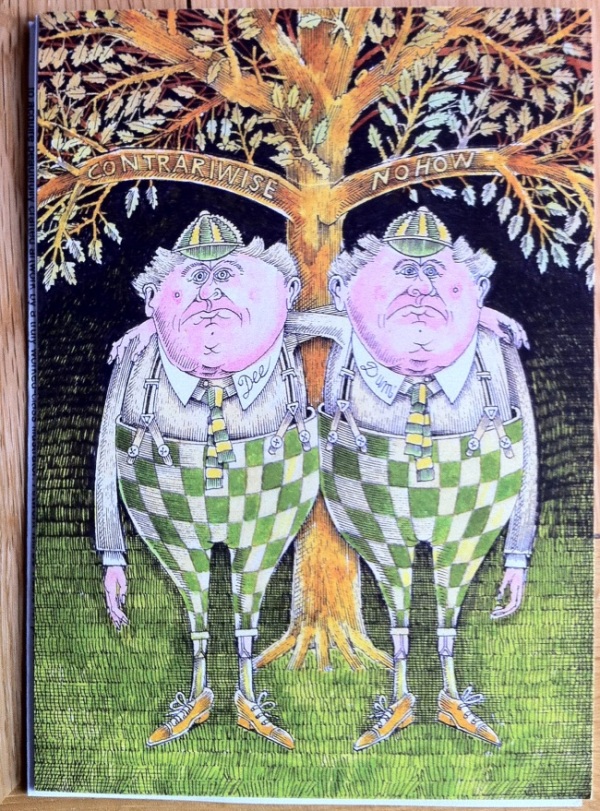
18 October 2012
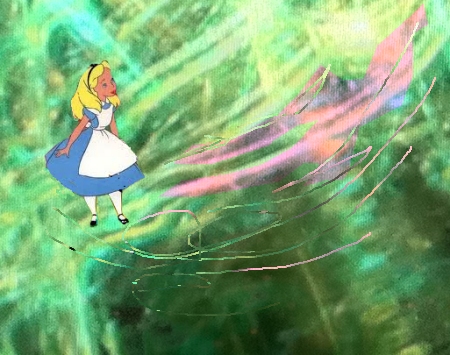
Alice in Wonderland Syndrome is a name given to a medical condition involving memory loss, disorientation, feeling you have changed in size and other symptoms. It is thought to be a form of migraine, although epileptics can also display similar symptoms.
The syndrome is not always as severe as what is described in this link, but many people think that Lewis Carroll might have had experiences with migraine and.or epilepsy which encouraged him to write about Alice changing her size, and so on.
In "The Mystery of Lewis Carroll" I cover what is known of this issue, and discussed the matter with a consultant neurologist - but I was left with the strong impression that it is very hard to diagnose people after they are dead!
The article interested me though, and I was very sorry for the poor woman described, who seems to have had far worse symptoms than Alice ever had.
12 May 2017
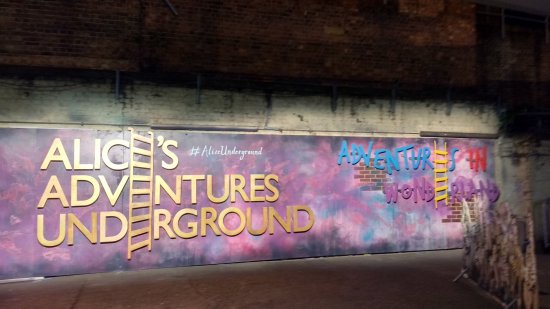
A few weeks ago I went to see Alice's Adventures Underground, in the Vaults beneath London's Waterloo station. This promenade performance is a tidied up version of a show that was a smash hit in 2015 (see reviews here and here)
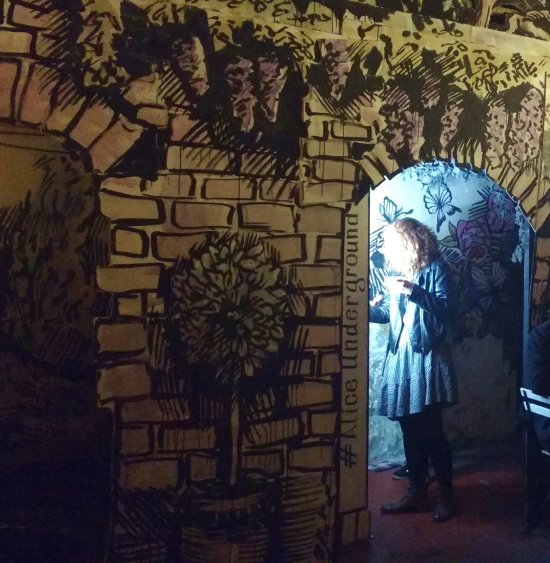
This time round, some effort has been made to insert a plot - no easy task when the point of the performance is to make sure that you never have the same experience twice. Audiences of some 50-odd are cleverly split into groups of no more than 14, each weaving their way in a kind of intricate choreography through a maze of sets ranging from the Gardeners' potting shed (full of red paint, of course) to the Duchess's crazy kitchen, with much more besides - the Caterpillar's shisha lounge, for instance, or weedledum and Tweedledee flying overhead as alarmingly as any Monstrous Crow, while arguing all the time...
I found it hard to follow the plot, but it really didn't matter at all. The whole experience is pretty psychedelic, so it's best to go with the flow - or, turn on, tune in and drop out. As for Alice, she was hardly to be seen, except for a few glimpses in mirrors, and a dancing figure on a zoetrope, and an unexpected appearance at the very end, just before the entire trial scene shut itself up like a pack of cards.
It's a clever, amazing experience, best for those who are fairly active and reasonably sober (you wait in a bar beforehand, and emerge into a cocktail lounge/games room at the very end.) The surfaces are rough and constantly changing, there are flights of stairs and rubber floors and narrow, awkward tunnels. No photos are allowed during the performance - not that there is really time to take any - but here are some of the photos I took in the bar. I left out the ones of me playing flamingo croquet or downing cocktails!
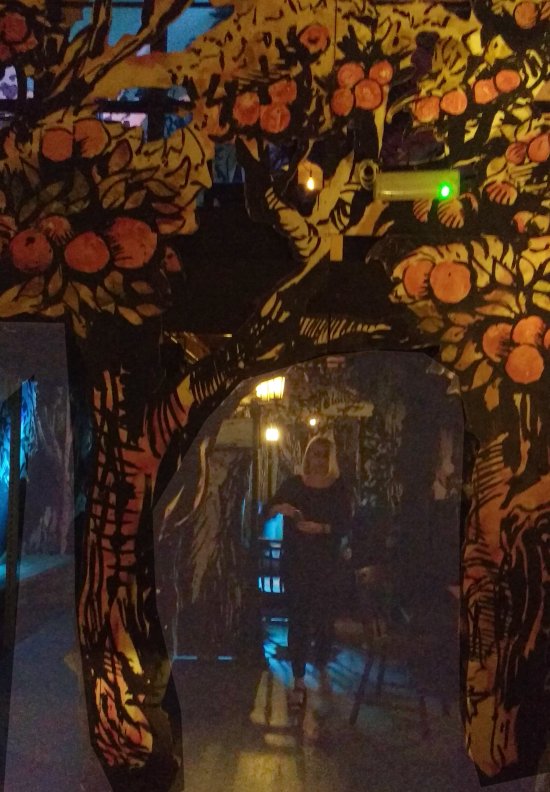
If you want to go, head over to this website and click the big green door. The little door leads to a different show aimed at kids - and that looks fun too. Tickets are from £39, a reasonable price for such an elaborate, immersive experience with such a multi talented cast.
27 October 2017
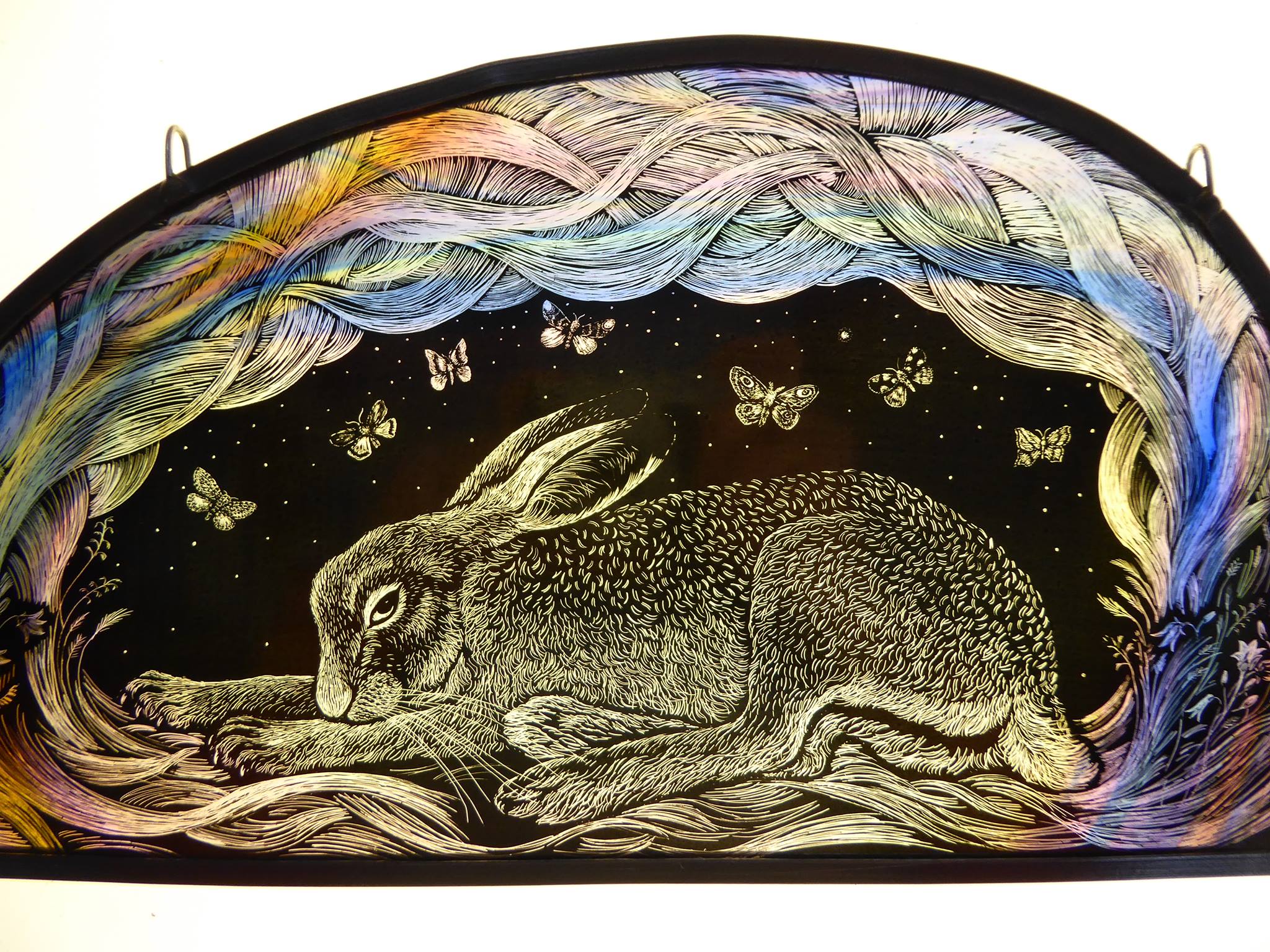
I've been wondering to myself how the Blue-Ginger Gallery in Malvern got its name. I'd never heard of it until I heard about their Alice exhibition (which began on 21 October and runs till 27 November).
On checking it out, I found that some fun events are coming up in November. On 6 November there's a talk by illustrator John Vernon Lord with an introduction from Mark Richards, ex Chairman of the LCS. (Unfortunately I was unable to publicise a whole talk by Mark on the 21st October, but it's taken me this long to fix technical problems with the website)! JOhn Vernon Lord's talk will include a drink and tea with the Mad Hatter - I'm not sure if that means a drink of tea but I suspect the tea is "extra."
You can needlefelt a Dormouse in a teacup, and make Alice themed silver jewellery in two further workshops, on 11 and 19 September respectively. Full details of how to book are here.
Some interesting artists represented at the exhibition include Tamsin Abbott, Mike Abbott, Graham Arnold, Eleanor Bartleman, Sue Carr, Annie Ovenden, Hannah Willow, Jo Verity, Carol James, Mollie Meager, Jo Dewar, Mariette Voke, Janis Waldron, Gen Belgard, Sue Brown, Karin Celestine, Jemima Jameson, Sue Williams, Sasha Rae, Maggie Hobbs, Gwen Vaughan, Rachel Padley, Heather Sweet-Moon, Ben Willis, Dave Cockroft and John Coombe
I particularly like Tamsin Abbott's work. She's very busy and isn't taking commissions at present, but has done some wonderful stained glass work which can be seen on her website here.
And that's one of her images at the top of this post.
15 December 2006
My mother said yesterday that she reckons Lewis Carroll will soon rise from his tomb, tap me on the shoulder and say thanks for the radio programme I've just done about him. It was about time someone took a look at him which took into account the fact that he was a real person; got up, went to the toilet, got dressed, had breakfast, etc. and had a whole life when he was NOT walking around thinking "I am the author of Alice in WonderlanD" but was perhaps instead worrying about his overdraft or feeling annoyed about someone who had been rude to him ten minutes ago.
In fact, he was in every way as real as I am - and he lived in places I have visited often. But he, and everyone he knew, have disappeared.
I often think it's strange that there have been so many people living in my part of the world, (some of them even living in my Victorian house) and yet I don't know a thing about them. They stood beneath the same sky, walked up and down the same hills: some of them heard the same click as our front door closes. Yet, because they're in a different dimension of Time, they and everyone they know are unfamiliar to me.
I've starting writing a bit of fiction with this in mind. It's about a man who gets an obsession he hates. At present, I'm working towards the idea that Time will put a new perspective on his problem.
To return to Carroll: now I've finished the programme, I'll start the biography. In fact I'm calling it an Anti-Biography because that is what it will be. With Carroll, in particular, it's worth looking at the spaces between - the mysterious gaps in his life, instead of only the censored facts themselves. Then you learn all kinds of unexpected things - an idea which would have probably have pleased Carroll, who specially liked doing things upside down and back to front. Karoline did this in her book but mine will not draw any conclusions - I'll try letting its readers draw them. My agent, Andrew Lownie is keen to start selling it. First I have to write a sample chapter. That will be my task for the Christmas holidays.
In fact, he was in every way as real as I am - and he lived in places I have visited often. But he, and everyone he knew, have disappeared.
I often think it's strange that there have been so many people living in my part of the world, (some of them even living in my Victorian house) and yet I don't know a thing about them. They stood beneath the same sky, walked up and down the same hills: some of them heard the same click as our front door closes. Yet, because they're in a different dimension of Time, they and everyone they know are unfamiliar to me.
I've starting writing a bit of fiction with this in mind. It's about a man who gets an obsession he hates. At present, I'm working towards the idea that Time will put a new perspective on his problem.
To return to Carroll: now I've finished the programme, I'll start the biography. In fact I'm calling it an Anti-Biography because that is what it will be. With Carroll, in particular, it's worth looking at the spaces between - the mysterious gaps in his life, instead of only the censored facts themselves. Then you learn all kinds of unexpected things - an idea which would have probably have pleased Carroll, who specially liked doing things upside down and back to front. Karoline did this in her book but mine will not draw any conclusions - I'll try letting its readers draw them. My agent, Andrew Lownie is keen to start selling it. First I have to write a sample chapter. That will be my task for the Christmas holidays.
30 December 2006
Not sure how a Lewis Carroll related blog will work, but here goes. We just did a Radio 4 programme about him, which went out and seems to have been well received - it got onto Pick of the Week and the BBC website wanted an article too. I'm pleased because it's obviously offered an antidote to the creepy image that Carroll is so often saddled with.
Actually it's interesting how so many creative people project their own obsessions onto Carroll. Some of the results are great - I love Polixeni Papapetrou's photos (www.polixenipapapetrou.net). Others, though - hm. You sort of feel that just because he's famous, they're clinging on catching whatever fame is to be had ..the names Katie Roiphe and Frank Beddor spring to mind.
There again, being dead I suppose Carroll has to be fair game. Anyway there's a streak of strangeness and mystery running through him which makes him constantly interesting
I was passing Fortnum and Masons when I spotted their wonderful Christmas windows which are themed on Alice in Wonderland. I wondered who did them, but couldn't see a signature.
Actually it's interesting how so many creative people project their own obsessions onto Carroll. Some of the results are great - I love Polixeni Papapetrou's photos (www.polixenipapapetrou.net). Others, though - hm. You sort of feel that just because he's famous, they're clinging on catching whatever fame is to be had ..the names Katie Roiphe and Frank Beddor spring to mind.
There again, being dead I suppose Carroll has to be fair game. Anyway there's a streak of strangeness and mystery running through him which makes him constantly interesting
I was passing Fortnum and Masons when I spotted their wonderful Christmas windows which are themed on Alice in Wonderland. I wondered who did them, but couldn't see a signature.
02 February 2007
There isn't half a lot of work writing a book proposal. I didn't realise it has to be so precisely targeted and so exactly right. I had always assumed that publishers would spot an idea they liked the look of and then be prepared to work with the author to get it right. I suppose this must mean that I had some idea of publishers as middleaged men and women in tweedy suits sitting in panelled offices, hoping for talented authors to turn up. Goodness knows why I thought this: I must have been mad. Anyway it is of course very big business with a lot of money at stake, and there are so many people desperate to get into print.
Even publishing our own short run small edition book was surprisingly expensive, and we did all the work ourselves: to be honest, I am not sure how anyone makes money out of this business but luckily I don't have to carry that responsibility - I only have to write the stuff.
I have been offered a couple of engagements on the strength of the radio programme - it's nice to know that people are interested.
Even publishing our own short run small edition book was surprisingly expensive, and we did all the work ourselves: to be honest, I am not sure how anyone makes money out of this business but luckily I don't have to carry that responsibility - I only have to write the stuff.
I have been offered a couple of engagements on the strength of the radio programme - it's nice to know that people are interested.
08 February 2007
Just come across Jessie Bond's autobiography online. She was a Victorian singer and actress who made a special name for herself in Gilbert & Sullivan. Her story is quite a fascinating one. It's written in a conversational style, without any intellectual pretentions.
LIfe in the Victorian theatre was hard work but much more fun for a woman than most things that they were allowed to do. Needless to say it was regarded as "not quite nice" and Jessie observes that she was a bit worried about making the transition from singing classical music to acting because of the potential damage to her reputation.
It must have been great to be an actress, though, if you had any talent, because it was one of the few more-or-less respectable professions where a woman could earn her own money and be independent. Of course, however independent they were when single, if they got married they were still subjected to the will of their husbands.. Even the great Ellen Terry, one of the most famous stage actresses ever, was forced to give up acting when she married for the first time (in fact, her middle aged husband actually sent her to school as she was only 16!) Jessie claims she was pretty well abducted and forced to marry - and work. In those days, of course, all her earnings had to go to her husband since women had no right to keep their own money.
I don't like reading long documents on the computer so I looked for a copy of her book in online bookstores. Rip off! They cost hundreds of pounds! I suppose I'll have to print it out from the website, and read it on bits of paper.
I was of course hoping that she had known Carroll, and indeed he HAD seen her, although doesn't seem to have talked to her. In August 1891, he wrote "Went to town, to meet, at Paddington, Ethel Hatch, who is coming as my guest. In the evening we went to the Devonshire Park Theatre, and saw the "duologue" entertainment by Miss Jessie Bond and Mr. Rutland Barrington. It consists of three pieces, a Fancy Ball incident, a sham (mesmeric) Professor, and a scene between, a butler and ladies' maid, in which they recite the balcony-scene from Romeo and Juliet. It was very clever."
Ethel Hatch, by the way, had been one of Carroll's nude photographic models when she was about five years old. She had remained very fond of him and they were good friends - by this time, she was in her mid twenties and on this occasion she was accompanying him for a few days' holiday in a guest house at Eastbourne. Carroll's fondness for having young women as social partners sometimes gave rise to gossip, as it wasn't quite the done thing to do this in Victoriain days. Even though he was supposed to be such a respectable clerical type, he attended literally hundreds of plays in his life and was totally obsessed with them and besotted with the theatrical life.
LIfe in the Victorian theatre was hard work but much more fun for a woman than most things that they were allowed to do. Needless to say it was regarded as "not quite nice" and Jessie observes that she was a bit worried about making the transition from singing classical music to acting because of the potential damage to her reputation.
It must have been great to be an actress, though, if you had any talent, because it was one of the few more-or-less respectable professions where a woman could earn her own money and be independent. Of course, however independent they were when single, if they got married they were still subjected to the will of their husbands.. Even the great Ellen Terry, one of the most famous stage actresses ever, was forced to give up acting when she married for the first time (in fact, her middle aged husband actually sent her to school as she was only 16!) Jessie claims she was pretty well abducted and forced to marry - and work. In those days, of course, all her earnings had to go to her husband since women had no right to keep their own money.
I don't like reading long documents on the computer so I looked for a copy of her book in online bookstores. Rip off! They cost hundreds of pounds! I suppose I'll have to print it out from the website, and read it on bits of paper.
I was of course hoping that she had known Carroll, and indeed he HAD seen her, although doesn't seem to have talked to her. In August 1891, he wrote "Went to town, to meet, at Paddington, Ethel Hatch, who is coming as my guest. In the evening we went to the Devonshire Park Theatre, and saw the "duologue" entertainment by Miss Jessie Bond and Mr. Rutland Barrington. It consists of three pieces, a Fancy Ball incident, a sham (mesmeric) Professor, and a scene between, a butler and ladies' maid, in which they recite the balcony-scene from Romeo and Juliet. It was very clever."
Ethel Hatch, by the way, had been one of Carroll's nude photographic models when she was about five years old. She had remained very fond of him and they were good friends - by this time, she was in her mid twenties and on this occasion she was accompanying him for a few days' holiday in a guest house at Eastbourne. Carroll's fondness for having young women as social partners sometimes gave rise to gossip, as it wasn't quite the done thing to do this in Victoriain days. Even though he was supposed to be such a respectable clerical type, he attended literally hundreds of plays in his life and was totally obsessed with them and besotted with the theatrical life.
12 February 2007

We had some snow recently and I took this picture in the middle of the night. I love snowy scenes, always reminds me of the start of "The Lion the Witch and the Wardrobe" - one of the best bits of scene setting ever for a children's book. You really do feel that magical things can happen when the world is transformed by snow - even boring old South Hampstead! As far as my book proposal goes, I was taken ill about 10 days ago, very alarming, and the doc says I ought to slow down for a bit even though I feel better now. Easier said than done but I am quite glad to feel there is a bit more time to think about what I am going to be writing.
14 February 2007
I'm supposed to be going to Estonia on Monday to write an article, but I cancelled that. I'm going to wait a couple of months before travelling, so I'll be going in mid April instead now. A pity because I was really looking forward to tramping around in all that snow. Not that I don't like Spring, but I REALLY wanted to see Tallinn in the heavy snow.
After the medical incident a couple of weeks ago I have discovered that as soon as you have the slightest thing wrong with you, travel insurers refuse to cover you for it, however slight the risk. Having been very healthy till now I have never even thought about this before, and it came as an unpleasant shock.
Luckily I'm a member of the British Guild of Travel Writers, and sent an email round to members asking for comments. They are very nice and highly practical people and I've now received several useful suggestions, so I'm working my way through them. When I've researched them all, I'll write a little article about them for the guild newsletter, in the hope it will help others. It's a slight problem not being able to get travel insurance if you do travel writing, of course!
One of my plans has been to retrace Carroll's trip to Russia, or at least some of it. I daresay things have changed rather a lot since the mid 19th century and it would make a good article. So, if I can just find some suitable travel insurance....
After the medical incident a couple of weeks ago I have discovered that as soon as you have the slightest thing wrong with you, travel insurers refuse to cover you for it, however slight the risk. Having been very healthy till now I have never even thought about this before, and it came as an unpleasant shock.
Luckily I'm a member of the British Guild of Travel Writers, and sent an email round to members asking for comments. They are very nice and highly practical people and I've now received several useful suggestions, so I'm working my way through them. When I've researched them all, I'll write a little article about them for the guild newsletter, in the hope it will help others. It's a slight problem not being able to get travel insurance if you do travel writing, of course!
One of my plans has been to retrace Carroll's trip to Russia, or at least some of it. I daresay things have changed rather a lot since the mid 19th century and it would make a good article. So, if I can just find some suitable travel insurance....
20 February 2007
We cycled across London to Bethnal Green in the East End, where the toy museum has had a refurbishment. It is a branch of the V&A - I think it may be the original museum building of the 1860s rebuilt in the East End. It used to be a bit of a forgotten outpost, although very nice - with loads of dolls houses and historical costumes, not to mention rather odd Victorian furniture they couldn't find room for anywhere else, such as a chair made entirely of stag's antlers. Our older daughter adored the old style museum, and spent hours if not days gloating over the cases and cases of costumes and wax dolls, etc. We were afraid it might have been ruined in the way museums often are in a mistaken effort to make them "accessible" - which so often just makes them seem trivial and boring for adults and children alike once the knobs and buttons have been twisted and thumped. Bethnal Green has avoided that mistake, though. It has just the right balance of objects to look at, objects to play with and objects to marvel over. There are still lots of costumes, dolls, toys etc. from all ages and cultures, arranged in themes, and they've kept the Victorian cases crammed with items. There are absolutely stunning things like a life sized Georgian puppet theatre and a pink aeroplane you can ride in - I am not sure if it actually flies ;-) Anyone within reach of London who likes toys and childhood ought to visit - and as it was half term it was packed - but the museum absorbed them all. The central space is now a very good and reasonably priced cafe. We took loads of pictures and I could fill the space with them but I'll just put one - of an object Lewis Carroll would have loved - a large Victorian toy theatre most beautifully designed and detailed for one family. I have just pictured one corner of the stage and proscenium arch. Some of the characters are shown - a bejewelled mermaid, various animals, a soldier. I think the production is called "The Yellow Dwarf"
20 February 2007
The problem with writing a biography - or even an anti biography, like I am doing - is that it really is difficult to sum up anyone. In a strange way, the closer you get the harder they are to understand, and you end up unable even to see them clearly. I certainly couldn't write a biography of someone who was really close to me: objectivity would be impossible. So what makes biographers think they can really sum up someone else? It makes it even harder when that person is dead.
Still I had better not think too much along these lines or I will never do anything at alll....
I finally managed to download the photo of Bethnal Green museum's toy theatre, after some difficulty. This is a detail of just one of the toy theatres they possess. I will see if I can add an overview of the main hall, which is now a cafe and a shop, which gives an idea of how popular it is. What the picture doesn't show is the amazing fact that the museum can cope with all those people. I am not quite sure who the naked archer is in the foreground, but I suspect he was left over from the original Victorian contents. Possibly he sat down after a hard day's hunting in that chair made of stag's antlers (see last entry)
Still I had better not think too much along these lines or I will never do anything at alll....
I finally managed to download the photo of Bethnal Green museum's toy theatre, after some difficulty. This is a detail of just one of the toy theatres they possess. I will see if I can add an overview of the main hall, which is now a cafe and a shop, which gives an idea of how popular it is. What the picture doesn't show is the amazing fact that the museum can cope with all those people. I am not quite sure who the naked archer is in the foreground, but I suspect he was left over from the original Victorian contents. Possibly he sat down after a hard day's hunting in that chair made of stag's antlers (see last entry)
13 October 2007
I heard about Miss Snark's literary agent blog for years but I never read it because I didn't want to be writing fiction with publication in mind. Sounds stupid, but....after being a journalist for so long I was tired of looking over my shoulder and trying to suck up to those shadowy imaginary figures you have to please before your work sells. A bit like trying to write for a pantheon of not very likeable gods. www.misssnark.blogspot.com
25 February 2008
I've been obliged to do other things lately and Lewis has taken the back seat. But the book has now been sold in the UK - to Haus Publishing - and I'm very pleased. Their website is www.hauspublishing.com and I'm looking forward to starting to put the book together.
19 July 2008
Just a notiification of a new book on Carroll's philosophical ideas.
Its called BEHIND THE LOOKING GLASS and it's by Sherry Ackerman. Here's more info.
ORDER ONLINE AT W WW.C-S-P.ORG
BY E-MAIL AT ORDERS@C-S-P.ORG OR BY FAX AT +44 845 299 1908.
FOR GENERAL ENQUIRIES, PLEASE CONTACT US AT A DMIN@C-S-P.ORG.
CSP, PO BOX 302, NEWCASTLE UPON TYNE, NE6 1WR, UK.
SHERRY L. ACKERMAN, PH.D., IS PROFESSOR OF PHILOSOPHY AT COLLEGE OF THE SISKIYOUS, IN NORTHERN CALIFORNIA, USA.
AS AN ACTIVE SCHOLAR WITH THE INTERNATIONAL SOCIETY FOR NEOPLATONIC STUDIES, SHE HAS AUTHORED NUMEROUS PAPERS AND JOURNALS,
Its called BEHIND THE LOOKING GLASS and it's by Sherry Ackerman. Here's more info.
ORDER ONLINE AT W WW.C-S-P.ORG
BY E-MAIL AT ORDERS@C-S-P.ORG OR BY FAX AT +44 845 299 1908.
FOR GENERAL ENQUIRIES, PLEASE CONTACT US AT A DMIN@C-S-P.ORG.
CSP, PO BOX 302, NEWCASTLE UPON TYNE, NE6 1WR, UK.
SHERRY L. ACKERMAN, PH.D., IS PROFESSOR OF PHILOSOPHY AT COLLEGE OF THE SISKIYOUS, IN NORTHERN CALIFORNIA, USA.
AS AN ACTIVE SCHOLAR WITH THE INTERNATIONAL SOCIETY FOR NEOPLATONIC STUDIES, SHE HAS AUTHORED NUMEROUS PAPERS AND JOURNALS,
26 March 2007
In Carroll's personal scrapbook is pasted a poem from "Punch" of 1859 called "The Bards of Burns". It's all about a competition for the best Scottish poetry in the style of Robert Burns. This competition was a three day event in the Crystal Palace. (Yes, three days! Some people in those days had way too much spare time) Once I figured out what he was going on about, I enjoyed it very much, and it contained some great turns of phrase and interesting words. In fact I conjectured that it might be a previously unknown poem by Carroll.
On checking it out, though, I found it was by William Aytoun, who was one of the judges of the competition. I also learned that Aytoun wrote a very popular, but now almost-forgotten collection of comic poetry called the "Bon Gaultier" ballads. It looked to me as if Carroll had deeply admired these ballads and modelled some of his own poetry closely on them: there were so many stylistic similarities. So out of interest, I bought a copy of Bon Gaultier - a lovely little First Edition for less than a fiver. It's illustrated by Leech and Doyle, which is a bonus. The ballads are not to modern taste but they're good parodies and very witty, and to my slight surprise I have been enjoying them.
On checking it out, though, I found it was by William Aytoun, who was one of the judges of the competition. I also learned that Aytoun wrote a very popular, but now almost-forgotten collection of comic poetry called the "Bon Gaultier" ballads. It looked to me as if Carroll had deeply admired these ballads and modelled some of his own poetry closely on them: there were so many stylistic similarities. So out of interest, I bought a copy of Bon Gaultier - a lovely little First Edition for less than a fiver. It's illustrated by Leech and Doyle, which is a bonus. The ballads are not to modern taste but they're good parodies and very witty, and to my slight surprise I have been enjoying them.
09 May 2007
As a child, I never got into WInnie the Pooh. Guess I was too old. The adventures of Pooh and all the animals seemed very childish - and Christopher Robin seemed like a ridiculous boy, not at all like the boys I knew, who spent all day rushing around pretending to be fighter planes. But recently I found a First Edition of "The House at Pooh Corner" in a bargain box, and, in looking through it for damage, I found myself reading it. And it was wonderful. It may not have appealed to me as a child but certainly does as an adult.
Then I happened to spot Ernest Shepard's biography - he is of course the illustrator. He wrote two volumes and I have read the first, which is charming, and, as you'd expect, beautifully illustrated. He remembers his life until the age of 7 with such clarity and affection that you can quite see why he was the ideal illustrator for Pooh.
I'm still working at getting the book proposal right. It's fascinating to hear what various readers have to say, but it's tricky to know just how much attention to pay to them. I always, ALWAYS listen to criticism, because any feedback is useful to a writer, however bad or stupid I may privately think it is. But these professional readers don't know what I want and what I'm like, and they may suggest things I don't want to do at any price. I hope I'm treading the fine line between listening to them and retaining my independence. So far the proposal doesn' t have the right "voice," but I am sure it will come in time.
Then I happened to spot Ernest Shepard's biography - he is of course the illustrator. He wrote two volumes and I have read the first, which is charming, and, as you'd expect, beautifully illustrated. He remembers his life until the age of 7 with such clarity and affection that you can quite see why he was the ideal illustrator for Pooh.
I'm still working at getting the book proposal right. It's fascinating to hear what various readers have to say, but it's tricky to know just how much attention to pay to them. I always, ALWAYS listen to criticism, because any feedback is useful to a writer, however bad or stupid I may privately think it is. But these professional readers don't know what I want and what I'm like, and they may suggest things I don't want to do at any price. I hope I'm treading the fine line between listening to them and retaining my independence. So far the proposal doesn' t have the right "voice," but I am sure it will come in time.
01 July 2007
I haven't felt like writing the blog lately because I've been involved with trying to sell the old family home in SW London - rather sad to clear it out. It's been in the family nearly 100 years and is full of memories. It's more like getting rid of a dear old pet than a mere house. I've known it since my earliest memories and am familiar with every inch, in the way a child is - even the bits around the skirting boards.
My sister tried to buy it to live in it but property prices in London being what they are, she just couldn't raise the cash even by selling a larger house in the Midlands and raising over ?100,000 of extra cash. As I am not a beneficiary of the will, I can't help her out.
I'm still thinking about Carroll. Sometimes I feel as if Carroll is my brother - if not my incubus) - it's easy to forget that other people don't know anything and probably don't care either. So it's been a matter of pitching the proposal in a way that will interest not only those who ARE intrigued by him, but also the others who vaguely think he wrote "Peter Pan".
There's also the problem of giving a crash course in history. Carroll was such a one-off that he had some difficulty in fitting into his own society. (He might have had difficulty fitting into ANY society, although the 18th century might well have suited him more than the 19th).
But, to see how he dealt with his society, you have to know a bit about that society, and I can't assume that the reader knows, of course. It's fairly safe to guess they're not familar with the Oxford Movement, but shouldn't a reasonably educated person be able to make a guess about what Victorian genre paintings are? It's hard to get it right.
On an Angry Old Woman note, I was also shocked to find that a professional who read my proposal and reported on it, constantly misspelled and misused words in her report. She used "hoards" when she meant "hordes", was a fan of "greengrocer's apostrophe's" and consistently used "it's" as the possessive of "it". My inner schoolteacher was brandishing an imaginary red pen all over her report. She was a lovely lady, and perhaps her teachers felt that learning grammar and punctuation stifled creativity... but I confess that if I were making a career in publishing and couldn't spell or punctuate, I'd buy myself a book or go on a course.
Having said that, Lewis Carroll, for all his love of literature, was no great shakes in the punctuation department.
My sister tried to buy it to live in it but property prices in London being what they are, she just couldn't raise the cash even by selling a larger house in the Midlands and raising over ?100,000 of extra cash. As I am not a beneficiary of the will, I can't help her out.
I'm still thinking about Carroll. Sometimes I feel as if Carroll is my brother - if not my incubus) - it's easy to forget that other people don't know anything and probably don't care either. So it's been a matter of pitching the proposal in a way that will interest not only those who ARE intrigued by him, but also the others who vaguely think he wrote "Peter Pan".
There's also the problem of giving a crash course in history. Carroll was such a one-off that he had some difficulty in fitting into his own society. (He might have had difficulty fitting into ANY society, although the 18th century might well have suited him more than the 19th).
But, to see how he dealt with his society, you have to know a bit about that society, and I can't assume that the reader knows, of course. It's fairly safe to guess they're not familar with the Oxford Movement, but shouldn't a reasonably educated person be able to make a guess about what Victorian genre paintings are? It's hard to get it right.
On an Angry Old Woman note, I was also shocked to find that a professional who read my proposal and reported on it, constantly misspelled and misused words in her report. She used "hoards" when she meant "hordes", was a fan of "greengrocer's apostrophe's" and consistently used "it's" as the possessive of "it". My inner schoolteacher was brandishing an imaginary red pen all over her report. She was a lovely lady, and perhaps her teachers felt that learning grammar and punctuation stifled creativity... but I confess that if I were making a career in publishing and couldn't spell or punctuate, I'd buy myself a book or go on a course.
Having said that, Lewis Carroll, for all his love of literature, was no great shakes in the punctuation department.
14 August 2008
There's talk that Johnny Depp may play "Alice" in Tim Burton's new movie. Whether that is true or not I think it's a cool idea. I've thought for years that they should get a boy to play "Alice" because there's so much of Lewis Carroll in her. Have to say I didn't think of a middle aged man, even though that's a cruel way to describe Johnny Depp...
16 August 2008
Inconsequential comment of the year. My friend Lee read the blog entry of yesterday and remarked: "Vultures are sensitive creatures, and they can be highly strung." It took me a while to find a suitable illustration.
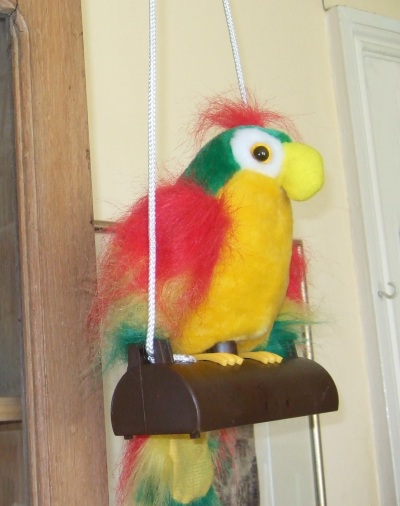 .)
.)
 .)
.)
20 August 2008
No time to write - I am about to catch my train to learn more about Carroll's maths. I regret to say the above title is not mine but Robin Wilson's - it's from his excellent book LEWIS CARROLL IN NUMBERLAND - HIS FANTASTICAL MATHEMATICAL LIFE which I highly recommend.
26 July 2007
I'm still busy with other things. But I was thinking that standard, straightforward biographies of Carroll tend to recycle the same old stuff without looking behind the surface at the kind of man he actually was. I am trying the whole time to imagine what he must have been like. What would I have felt if I already knew him and he walked into the room? Would my spirits rise, fall or stay the same?
He saw life so differently from most people that those who had the chance to creep behind his stiff exterior seem to have been delighted to have the chance of his company. I imagine that he would have frozen me out though - probably because I'd want to know so much about him. These reflections can become rather circular....
He saw life so differently from most people that those who had the chance to creep behind his stiff exterior seem to have been delighted to have the chance of his company. I imagine that he would have frozen me out though - probably because I'd want to know so much about him. These reflections can become rather circular....
30 July 2007
You can't do a really successful imitation of another person's writing any more than you can copy that person's personal mannerisms. There's a little spark that's uncopy-able.
So I'm puzzled about "Wasp in a Wig". It is a so called suppressed chapter from one of the "Alice" books, discovered in galley proof some years ago. It tells how Alice meets a sad old wasp who sings a song for her. The wasp is unattractive, and dull, the song is average music hall stuff. It's sort of like Carroll, but not really. And because the quality is so much worse than the rest of the book, many people think it's not his work.
However the annotations are in his own hand, and, having once studied handwriting analysis, I sneakily took a magnifying glass and checked some of the tiny little pen marks which we all make and are distinctive and unique to us. The tiny marks in the handwriting are definitely Carroll's. So I think he did write this chapter and it got as far as galleys before he pulled it.
What intrigues me is that it feels and reads like a copy of his work. It entirely lacks charm and life. It is as if it were written by someone copying him. People often say Carroll had two distinct personalities and reading "Wasp in a Wig" makes me think this might indeed be so. Thank goodness his creative side managed to pull the chapter in time.
So I'm puzzled about "Wasp in a Wig". It is a so called suppressed chapter from one of the "Alice" books, discovered in galley proof some years ago. It tells how Alice meets a sad old wasp who sings a song for her. The wasp is unattractive, and dull, the song is average music hall stuff. It's sort of like Carroll, but not really. And because the quality is so much worse than the rest of the book, many people think it's not his work.
However the annotations are in his own hand, and, having once studied handwriting analysis, I sneakily took a magnifying glass and checked some of the tiny little pen marks which we all make and are distinctive and unique to us. The tiny marks in the handwriting are definitely Carroll's. So I think he did write this chapter and it got as far as galleys before he pulled it.
What intrigues me is that it feels and reads like a copy of his work. It entirely lacks charm and life. It is as if it were written by someone copying him. People often say Carroll had two distinct personalities and reading "Wasp in a Wig" makes me think this might indeed be so. Thank goodness his creative side managed to pull the chapter in time.
07 October 2007
You spend so long trying to get an agent and when you do, you think it's all over bar collecting your cheque. Really, it's just the beginning.
Carroll paid for printing and illustration, supervised everything himself and Macmillan simply published and distributed it under their imprint in the usual way. I'm sure he would have sent an agent mad. He almost sent Macmillan's mad, although in a way I think they rather liked him a bit the way that it can sometimes be quite nice to have an itch if you can scratch it..
Anyway, if the figures I have been seeing in "The Author" about the economics of publishing are correct, we made almost as much money publishing our small-run "Lewis Carroll In His Own Account" than many authors collect from legitimate publishing houses. It'll be interesting to see how much I make from this biography, if it ever gets out there!
Carroll paid for printing and illustration, supervised everything himself and Macmillan simply published and distributed it under their imprint in the usual way. I'm sure he would have sent an agent mad. He almost sent Macmillan's mad, although in a way I think they rather liked him a bit the way that it can sometimes be quite nice to have an itch if you can scratch it..
Anyway, if the figures I have been seeing in "The Author" about the economics of publishing are correct, we made almost as much money publishing our small-run "Lewis Carroll In His Own Account" than many authors collect from legitimate publishing houses. It'll be interesting to see how much I make from this biography, if it ever gets out there!
14 October 2007
I wrote a few entries back about W. Aytoun of Bon Gaultier fame (or at least, 19th century Bon Gaultier fame). I recently heard from one of the descendants of Lewis Carroll's brother Wilfred, who said Aytoun had died in the very house he now lives in, Blackhills, in Scotland. From its website Blackhills looks like a fab mansion and it had apparently been rented out from the Duke of Fife and belonged to the royal family until early in the 20th century
As Aytoun's verse so obviously influenced Carroll, Carroll would probably have been interested to hear he had died. How much more interested would he be to know that the house he died in would one day be inhabited by a member of his own family? That's a question - I don't know the answer to but I dare say that, being a teeny bit of a snob, he'd have liked the idea of the family owning a house which had once belonged to royalty!
As Aytoun's verse so obviously influenced Carroll, Carroll would probably have been interested to hear he had died. How much more interested would he be to know that the house he died in would one day be inhabited by a member of his own family? That's a question - I don't know the answer to but I dare say that, being a teeny bit of a snob, he'd have liked the idea of the family owning a house which had once belonged to royalty!
02 June 2008
I'm updating the site. It will include more of my current work and also make it more secure - it's been plagued by spam to the point that the ISP demanded more money for extra bandwidth!
I'll also be setting up more links and generally making it more user friendly.
I found a good little movie on YouTube by children's writer Candy Gourlay about getting an agent for your fiction. Her daughter and their friends did it during their half term break and I love it. Candy has worked really hard for the UK branch of the Society of Childrens Book Writers and Illustrators and I reckon her book Volcano Child will be a sensation.
http://notesfromtheslushpile.co.uk/2008/06/why-writers-need-agents.html
I'll also be setting up more links and generally making it more user friendly.
I found a good little movie on YouTube by children's writer Candy Gourlay about getting an agent for your fiction. Her daughter and their friends did it during their half term break and I love it. Candy has worked really hard for the UK branch of the Society of Childrens Book Writers and Illustrators and I reckon her book Volcano Child will be a sensation.
http://notesfromtheslushpile.co.uk/2008/06/why-writers-need-agents.html
22 August 2008
Saw a copy of Maggie Taylor's surrealist "Alice in Wonderland" which is based on very old photographs - daguerrotypes, I think, although they've been so doctored it's hard to tell. Check it and see....Her book's expensive but I've seen a copy and it's well produced. I've put it on my Christmas list....
24 August 2008
I discover that my BBC Radio 4 programme on Carroll is on a BitTorrent site called Demonoid.com. BitTorrent is peer-to-peer distribution of pirated stuff. People signing up can hear the whole programme but in exchange they have to agree to host parts of other programmes on their computers, so no one site hosts the whole thing. Demonoid isn't taking any more applicants at present, and I suspect it's not legal. I'm strangely pleased that someone thought the programme interesting enough to be worth pirating though. It DID get two sections onto BBC Pick of the Week at the time, but this is the only way anyone will hear it now, since the BBC has taken it offline.
30 July 2008
I've said this won't be a conventional biography. I want it to be more accessible and less detail-heavy than most biographies - but of course it is QUITE like a biography.
And I hadn't realised how close I'd get to Carroll in writing this. I trained in art, and the whole thing is starting to remind me of how you feel after you've been sitting drawing the same thing for two or three days. It becomes familiar in an entirely different way from how it seemed after just a few hours. You get a feeling for the "realness" of it.
Before the book was sold, I wrote a proposal which involved drafting out my plans in detail. I hated doing it! I'd got to grips intellectually with how the book should be - but not artistically. It was incredibly offputting to have it critiqued so often in the planning stage. Yet, tough though it was, I learned a lot and the groundwork I put in then is useful now.
Still, the thing about Carroll is that as soon as you feel you know him, he comes up with something that reminds you of how unusual he was. Then, you remember how he can appear so simple and easy, till that "something" changes, and he's strange again. It reminds me of his Mad Gardeners Song, about an unnamed man who thinks he sees things and then finds they are other things. It's the only rhyme or song I can think of to quote about this.
My favourite verse is this one:
He thought he saw a Coach-and-Four
That stood beside his bed:
He looked again, and found it was
A Bear without a Head.
"Poor thing,' he said, "poor silly thing!
It's waiting to be fed!"
It's so Carrollian - first, the sinister image of the coach-and-four horses beside his bed, and the even more sinister headless bear which it silently changes into. But instead of being afraid, suddenly you realise it's just a poor old teddy that needs to be pitied: it is hungry, and it is also rather comical, since without a head it can't eat anything. And, perhaps, it is about time it put its head back on again and started being sensible.
And I hadn't realised how close I'd get to Carroll in writing this. I trained in art, and the whole thing is starting to remind me of how you feel after you've been sitting drawing the same thing for two or three days. It becomes familiar in an entirely different way from how it seemed after just a few hours. You get a feeling for the "realness" of it.
Before the book was sold, I wrote a proposal which involved drafting out my plans in detail. I hated doing it! I'd got to grips intellectually with how the book should be - but not artistically. It was incredibly offputting to have it critiqued so often in the planning stage. Yet, tough though it was, I learned a lot and the groundwork I put in then is useful now.
Still, the thing about Carroll is that as soon as you feel you know him, he comes up with something that reminds you of how unusual he was. Then, you remember how he can appear so simple and easy, till that "something" changes, and he's strange again. It reminds me of his Mad Gardeners Song, about an unnamed man who thinks he sees things and then finds they are other things. It's the only rhyme or song I can think of to quote about this.
My favourite verse is this one:
He thought he saw a Coach-and-Four
That stood beside his bed:
He looked again, and found it was
A Bear without a Head.
"Poor thing,' he said, "poor silly thing!
It's waiting to be fed!"
It's so Carrollian - first, the sinister image of the coach-and-four horses beside his bed, and the even more sinister headless bear which it silently changes into. But instead of being afraid, suddenly you realise it's just a poor old teddy that needs to be pitied: it is hungry, and it is also rather comical, since without a head it can't eat anything. And, perhaps, it is about time it put its head back on again and started being sensible.
31 July 2008
On the Latest Info page I listed some of the weird and wonderful things which Carroll is accused of being. One of those is an "adulterer" and I was contacted by Karoline Leach who thought I was criticising her book "In the Shadow of the Dreamchild". I think this is a really valuable and indeed downright revolutionary book in Carroll studies, but funnily enough the only premise in it which I don't really believe in is that Carroll could have been an adulterer. Leach sets out some good arguments, but my objection is that, however good the arguments, it just couldn't have happened because it was not practical.
Christ Church was an incredibly closed community with hundreds of pairs of eyes and ears around - not just the many living-in undergraduates and dons, but many, many servants too. In their little world, could the boss's wife having it off with a junior don possibly go unnoticed? I am sure it could not, even today. And the fact that there was no gossip about Carroll and Mrs. L. sets the seal on it.
But I had a little smile at the idea of Carroll tiptoeing into the Deanery, tipping the servants 2/6d each to keep quiet, making sure Alice was out of the way in the schoolroom and then having his way with Mrs. L, having unlaced all her stays and undone all the buttons on her boots first.
Christ Church was an incredibly closed community with hundreds of pairs of eyes and ears around - not just the many living-in undergraduates and dons, but many, many servants too. In their little world, could the boss's wife having it off with a junior don possibly go unnoticed? I am sure it could not, even today. And the fact that there was no gossip about Carroll and Mrs. L. sets the seal on it.
But I had a little smile at the idea of Carroll tiptoeing into the Deanery, tipping the servants 2/6d each to keep quiet, making sure Alice was out of the way in the schoolroom and then having his way with Mrs. L, having unlaced all her stays and undone all the buttons on her boots first.
03 August 2008
Having been making some long car trips, we've got a CD of Alice in Wonderland to keep Sidney happy. He's 6 and perhaps a bit young but he is fascinated by the story. I'd never heard the whole thing read aloud before, and when I did I suddenly realised why some WW1 soldiers are said to have taken "Alice in Wonderland" into the trenches with them, and why some people still read it when they feel low.
Alice Liddell doesn't sound as if she was a very likeable or indeed very interesting adult, but in the story she comes over as a clever, quaint and assertive little girl, the type who would be quite a useful companion in a tough situation.
My theory - which I go into in the book - is that Carroll wrote both his "Alice" books when he felt in need of some escapism. I can now see how the memory of the "real" Alice could provide that for him.
How delightful to wander through life with someone who is naively courageous and basically optimistic in a puzzling world, and who always deals politely and yet effectively with whatever madnesses life sends her way, and is never downcast for long.
When I read the book from now on, I will see the shadow of Carroll accompanying her through the miseries which were afflicting his own life at the period. I will understand emotionally, not just intellectually, how it made him feel better to have her around.
Alice Liddell doesn't sound as if she was a very likeable or indeed very interesting adult, but in the story she comes over as a clever, quaint and assertive little girl, the type who would be quite a useful companion in a tough situation.
My theory - which I go into in the book - is that Carroll wrote both his "Alice" books when he felt in need of some escapism. I can now see how the memory of the "real" Alice could provide that for him.
How delightful to wander through life with someone who is naively courageous and basically optimistic in a puzzling world, and who always deals politely and yet effectively with whatever madnesses life sends her way, and is never downcast for long.
When I read the book from now on, I will see the shadow of Carroll accompanying her through the miseries which were afflicting his own life at the period. I will understand emotionally, not just intellectually, how it made him feel better to have her around.
14 September 2008

When I walked into this garden yesterday, I felt as if I'd walked into the garden in Looking Glass Land - even to chess pawns on the topiary.
In reality the garden isn't themed on Alice (or on chess) and is in Marvao, Alentejo, Portugal. It's an extraordinary medieval village topped with a huge rambling castle and it could be the setting of many a fairy tale.
23 September 2008
One of the best things about the "Alice" characters is the way they are ludicrous and unlikely, yet you do meet them out and about. Yesterday in central London I saw a man on a bicycle hung all over with extraordinary things. I plucked up courage to ask him what the washing-bowls fixed over the handle-bars were for. He informed me that they were to keep the wind off his hands when he was cycling, so they would stay warm. I should have waited to see if he burst into rhyme.
28 September 2008
The Inn Sign Society has a special section on its website about cats. It says that the first recorded mention of a Cheshire Cat was in 1770, and a pub called The Cheshire Cat in Christleton, near Chester, commemorates this.
Carroll spent his early life in Cheshire, but it's not known if he ever visited this pub. It dates from 1801, which is thirty-one years before his birth; so it is by no means impossible.
He would probably have liked the Inn Sign Society: he was all for saving traditional things.
Carroll spent his early life in Cheshire, but it's not known if he ever visited this pub. It dates from 1801, which is thirty-one years before his birth; so it is by no means impossible.
He would probably have liked the Inn Sign Society: he was all for saving traditional things.
